






















Thanks for picking up the latest edition of Business Leader magazine. Feels like only a few days ago we were listening to Chris Rea and Noddy Holder and munching mince pies. But business never sleeps and we’re already powering our way through 2023.

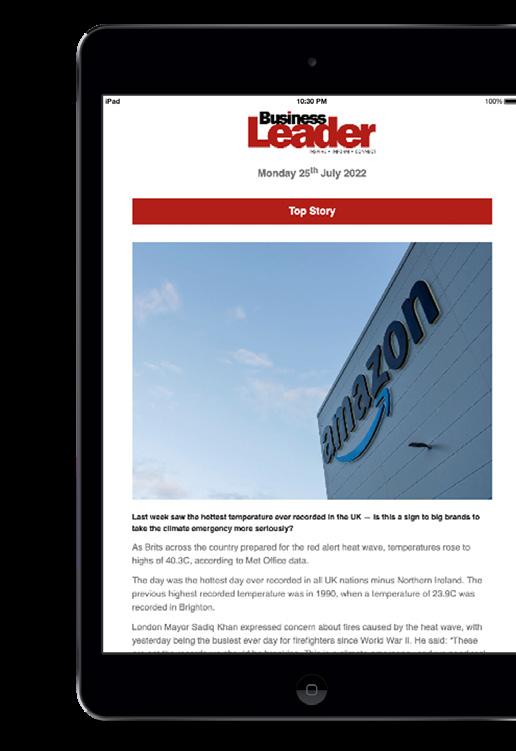
From our in-depth discussion with YouTube superstar-turned-investor-extraordinaire Caspar Lee and overcoming breaking point with SAS: Who Dares Wins star Ollie Ollerton, to a deep dive into the jobs of the future and looking into the M&A and funding forecast for the next 12 months, we’ve packed this edition with a mix of inspiration and analysis from some of the UK’s leading experts.
We’ve also entered an exciting time of our events calendar here at Business Leader, with our Scale-Up Awards and Business Leader South West Awards open for entries. The awards are a perfect opportunity to celebrate your company’s success, win new business, and get recognised alongside some of the country’s leading companies. Head to our website for more details.
Our parting thought - in a meeting with a prominent business leader earlier in the year, he said that his company wouldn’t be participating in the recession. Despite what the mainstream outlets are saying, this is a sentiment shared by many dogged entrepreneurs we’ve spoken to for this edition. Business leaders hold the key to recovery from this economic uncertainty, so go forth and grow, despite what the ‘leaders’ in Whitehall may say.
Oli Ballard Director Editor@businessleader.co.uk | @Oli_BLeaderEDITORIAL
Oli Ballard - Director
E: oli.ballard@businessleader.co.uk
James Cook - Digital Editor
E: james.cook@businessleader.co.uk
Serena Haththotuwa - Digital Editor
E: serena.haththotuwa@businessleader.co.uk
Alice Cumming - Digital Editor
E: alice.cumming@businessleader.co.uk
DESIGN/PRODUCTION
Adam Whittaker - Head of Design
E: adam.whittaker@businessleader.co.uk
SALES
Sam Clark - Head of Awards Sponsorship
E: sam.clark@businessleader.co.uk
DIGITAL & WEB
Josh Dornbrack - Head of Multimedia
E: josh.dornbrack@businessleader.co.uk
Nick Barnes - Video Editor
E: nick.barnes@businessleader.co.uk
Gemma Crew - Social Media & Community Manager
E: gemma.crew@businessleader.co.uk
Rosie Coad - Marketing Executive
E: rosie.coad@businessleader.co.uk
Joshua Phillips - Website Development
E: joshua.phillips@businessleader.co.uk
CIRCULATION
Adrian Warburton - Circulation Manager
E: adrian.warburton@businessleader.co.uk
ACCOUNTS
Jo Meredith - Finance Manager
E: joanne.meredith@businessleader.co.uk
MANAGING DIRECTOR
Andrew Scott - Managing Director
E: andrew@businessleader.co.uk
Business Leader Magazine is committed to a zero carbon future and supports the World Land Trust by using recyclable paper wrap rather than plastic polywrapping. Carbon-balanced PEFC® certified paper, which is sourced from responsible forestry, is produced in an environmentally-friendly way to offset our CO2 emissions.
CONNECTING BUSINESS LEADERS THROUGH NEWS, INTERVIEWS & EVENTS.
Want to stay on top of business news?
Leading journalists and contributors provide us with the information and analysis that directly impacts your business. Join our community of business owners, professionals and leaders that are driving the UK forward.
It’s more than just a magazine, join the Business Leader Network.


SUBSCRIBE TODAY
6 Editions £34.95
12 Editions £59.95
(VOLUME DISCOUNTS AVAILABLE) / CANCEL ANYTIME
BUSINESSLEADER.CO.UK/SUBSCRIBE


Dragons’ Den star Steven Bartlett has announced the launch of his new $100m Flight Story Fund, with the mission of accelerating the next generation of European Unicorns. Capital markets, and in particular private equity, took a huge hit in 2022. The launch of the Flight Story Fund has been timed to exploit the dislocation and disruption in the economy.
A study, commissioned by the Venture Capital Trust Association (VCTA), among 240 senior decision makers in charge of recently launched small businesses less than seven years old and employing up to 250 employees, reveals a strong appetite for growth despite the economic challenges facing the country. An overwhelming majority (92%) of respondents said they are likely to consider raising equity through a Venture Capital Trust.
In a clear sign that businesses of this type are pursuing a pro-growth agenda, the most popular reasons for requiring equity finance are to invest in R&D (48%), new technology (45%), and equipment and machinery (42%).
Over a third (36%) plan to use the funding to hire new talent and around a quarter (23%) to launch a new product or service. Just 17% of respondents said the fresh capital would be needed to improve their cash flow, which can be a sign of distress.
Over the last financial year, VCTA-backed businesses delivered £12.5bn in revenues, generating £3bn in exports and investing £548m in R&D. Over 75% of post-2015 VCT investee companies have invested in R&D.
Will Fraser-Allen, Chair of the VCTA, commented: “It’s encouraging to see such a strong level of demand for equity capital among early-stage businesses across all parts of the country.
“That businesses plan to deploy new capital to fund areas such as R&D, new technology and recruitment speaks to their pro-growth mindset. With the UK facing an uncertain future, their contribution is particularly important as many larger companies are under pressure to reduce costs and shelve investment plans.
“Young businesses, run by entrepreneurs with ambitious expansion plans, are supporting the health of our economy. We strongly believe that VCTs are ideally placed to continue funding this growth.”
Powered by Bartlett and other successful entrepreneurs, the Fund will be targeting individual investments between $1m-$10m in high-growth companies in six emerging categories – blockchain, biotech, health & wellbeing, commerce, technology and space
– and must have the potential to become Europe’s next Unicorn.
Bartlett comments: “Throughout the last decade, I developed an immense network of the most successful entrepreneurs in Europe. Flight Story Fund connects the founders to the investment and tools they need to catapult them through their growth trajectory to accelerate their timeline to Unicorn status.
“I’ve been on the journey myself and now I am helping other skilled founders succeed in the same way. The launch of the Flight Story Fund is an invitation to Europe’s best entrepreneurs from Europe’s best companies – come and take flight with us.”
Following a year of growth through 2022, cult British jewellery brand, Astrid & Miyu look to continue their ongoing investment into physical retail, opening the doors to 7 stores across the UK and Europe during Q4 (2022) and Q1 (2023).
“Community and experiences are a huge part of what makes Astrid & Miyu unique, and opening physical stores will enable us to deepen our relationship with our customers and the wider community. This has become more evident post-COVID with a shift to consumers wanting reallife experiences, warmth and a sense of belonging.” notes Connie Nam, Founder & CEO.




GPE has recently announced that the jewellery maker, Pandora, has signed a lease for a new concept store in London within 70/88 Oxford Street, taking the retail space to 96% let.

Pandora will occupy the prime corner unit of the Oxford Street development, located directly opposite the Tottenham Court Road Elizabeth Line exit, on Dean Street. The renowned jewellery brand has acquired space across two floors, with fantastic double-height signage immediately visible from the station exit.
The new unit will be Pandora’s third on Oxford Street, but its first one east of Oxford Circus. Pandora will join Boom: Battle Bar, the competitive socialising escape room concept, which opened at the end of 2022, and well-known fashion retailer Reserved, occupying 19,645 sq ft, at 70/88 Oxford Street, set to open Q3 2023.
Sarah Goldman, Senior Portfolio Manager at GPE commented: “We are thrilled to announce that Pandora has chosen 70/88 Oxford Street as its latest store location in London. As a hugely popular and globally recognised brand, Pandora will add to the premium retail offering across our wider West End portfolio.
“Together with Boom: Battle Bar and Reserved, the development is becoming a prime destination on the doorstep of the Elizabeth Line station at Tottenham Court Road. We look forward to welcoming Pandora and to the buzz and attraction the site will bring to London’s West End this year.”
The global provider of travel risk management and international medical, security, and travel assistance services found five top risks for businesses in 2023 in its annual Risk Outlook for 2023.

1. Energy Crisis
2. Deepening political polarisation
3. Increasing cyber risks
4. Diversification of global extremism threats
5. Climate risk
Chris Job, Director of Risk Management Services at Healix International, comments:
“Business leaders will be well aware of the various disasters and emergencies playing out on the global stage, yet some are inadequately equipped to mitigate the risks they pose to business assets and personnel.”
MGISS, one of the UK’s geospatial technology companies, has launched a new project, part-funded by the European Space Agency (ESA), to help minimise nationwide disruptions to gas and water supply. The project, Interruption Prevention Alert Service (IPAS), will use cuttingedge technology to identify and locate development risks within close proximity of critical utility assets. Gas and water outages caused by developments are a growing problem and IPAS will offer a preventative solution, using satellite data and services to automatically detect changes to the built environment.

The challenges that utilities providers face are also likely to intensify with the Government’s anticipated easing of UK planning laws as part of the Levelling Up and Regeneration Bill, along with proposed additional investment in infrastructure and housebuilding.
Michael Darracott, Managing Director at MGISS, said: “I’m looking forward to working with our partners to promote the value of capturing, using, maintaining, and leveraging accurate and reliable geospatial data.
“We already have a significant amount of interest from operators within the water and gas sectors, and we envisage wider potential in other sectors of the UK and global economies.”
Real Business Rescue analysed ten years’ worth of data to uncover whether director disqualifications have increased or decreased.
In the financial year 2021/22, a total of 802 disqualification orders and undertakings took place, a 31% decrease on the total number in FY 2011/12 (1,165).
Unfair treatment of the Crown is by far the most common allegation over the
last 10 years and is associated with 37% of director disqualifications in FY 2021/22.
The last three months of data also show that at least 125 fraudulent cases of the Buy Back Loan Scheme have been recorded. With each disqualification sentence averaging at eight years per director, these cases account for 1,003 years’ worth of bans.

Media and marketing company, the Ascot Group, has announced it will be sponsoring an Olympic hopeful in 2023.
The Ascot Group, which is made up of seven companies including Business Leader, will be wholeheartedly supporting young Judo star, Lele Nairne, as part of its ongoing commitment and investment to make a positive impact on the wider community.

Born and raised in the South West of England, Lele is an incredible athlete, and the Ascot Group has agreed to support her ambitions of becoming an Olympic medallist and Judo world champion.
Andrew Scott, CEO and Founder of the Ascot Group, said: “I’m delighted to announce that we will be sponsoring and financially backing Lele’s training and worldwide competitions throughout the year.
“Lele is a fantastic athlete who has trained in Judo for most of her life. She has already ranked 23rd in the world and now has her sights firmly set on the 2024 Paris Olympics.
Icelandic deep tech company Treble Technologies, which specialises in sound simulation for real-world application as well as bringing hyper-realistic audio soundscapes to the metaverse, has raised €8m (£6.9m). Treble’s proprietary technology aims to disrupt the world of sound: how it is understood, modelled, and moulded.

The seed round was led by leading Nordic VC Frumtak Ventures, with participation from NOVA (the venture arm of Saint-Gobain, the Fortune 500 company that is one of the world’s largest building materials companies) and various angel investors.
“Lele is someone we can really get behind and be incredibly proud of. Her drive and passion for Judo is inspirational, it’s clear that she lives and breathes everything associated with the sport.
“I can’t wait for the whole Ascot team to show its support for Lele as she embarks on this exciting journey to Olympic success.”
Lele Nairne comments: “It’s amazing to have the Ascot Group and its group of companies agree to be a sponsor. I’ve got some really exciting things in the pipeline for the next 12 months and with the support from Andrew and his team, I’ll be a step closer to achieving my goals.”

Embracing YouTube before most people had even heard of it, through perseverance and grit, Caspar Lee rose to become one of the biggest content creators on the planet.
From his bedroom as a teenager in South Africa, he built his channel amassing a seismic following and leading him to collaborate with many of the world’s biggest stars including Dwayne ‘The Rock’ Johnson, Anna Kendrick, Ed Sheeran and Kevin Hart. Caspar leveraged his success and cofounded a global influencer marketing business. The company operates globally with 100+ employees and boasts many of the world’s leading brands as clients, including Coca-Cola and Google. He also co-founded Creator Ventures, a $20m VC fund investing in start-ups alongside a syndicate of top creators, musicians, athletes and actors.

We met at his company Influencer’s offices for an exclusive discussion about his transition from YouTuber to entrepreneur, tips for raising investment, failure and much more.
CAN YOU TELL US MORE ABOUT YOUR BACKGROUND?
I was grew up in South Africa. When I was sixteen, I launched a YouTube channel, and my family and friends didn’t think it was very good. After two years, I only had one thousand subscribers, but I stuck with it, and it began to improve.
I started to collaborate with other YouTubers and eventually built an audience of over six million subscribers and I was able to travel around the world. The creator economy opened lots of opportunities for me.
WHAT ARE YOU DOING NOW?
I have a business I founded called Influencer. We have over a hundred employees, five offices around the world and we work with brands like Google and Coca-Cola.
I also have a talent management company with Joe Sugg and an investor fund called Creator Ventures, which has $20m to invest in consumer internet companies and those in the creator economy and social media space.
IT MUST HAVE BEEN DIFFICULT BEING ONE OF THE FIRST YOUTUBERS AND PEOPLE TELLING YOU IT WASN’T A CAREER?
Yes, it was. When I was sixteen, people were saying ‘Caspar why don’t you just stop and get a proper job?’ Within the last three years, I have noticed a big change in the space, and it’s now seen as a ‘legitimate’ career where you can make money and be successful, whereas it wasn’t when I started out.
WHAT WOULD YOU SAY IS THE SECRET TO SUCCESS IN THE FIELD?
Collaboration, consistency, and creativity. The most important is collaboration, not only within creating content but now within business and brand building too.
Creativity also means just putting things out there and throwing ideas into the world. People don’t care if every video is perfectly produced and how it performs. It’s about being consistent and getting stuff out.
WHAT DO YOU SAY TO A BUSINESS OWNER WHO SAYS THAT SOCIAL MEDIA ISN’T FOR THEM?
I would say it is becoming relevant to all businesses. For example, I have a student accommodation company in Cape Town. It’s a traditional sector but we’re using social media to build a brand because our current and future customers are looking at brands online and their social media accounts before they buy.

If you walk up the street and see a gross coffee shop, you’re not going to go in. It’s the same if you come across a bad Instagram or Facebook page for a business – you might not engage with them. It just needs to be good enough because it may not be your primary source for business but it’s there in the background. It needs to be good because people will find it and search for these pages whilst they are checking out your company.
HOW HAS IT BEEN TO ADAPT FROM BEING A CONTENT CREATOR TO AN ENTREPRENEUR?
There are many differences but also so many similarities. When you are an entrepreneur, you are forced to build a team but as a content creator, you can get away with doing everything on your own.
Also, with a business that has one hundred people, I can take a step back and have weekends to myself as I know that together we are building something, and I am not relying just on myself.
As a creator, when you become successful, people want to work with you and you can create cashflow easily. However, when you start a business, you realise how difficult it is to make money. Even if you do an amazing job, you can still lose clients. This forces you to create a different structure and surround yourself with the best talent. HAS BEING IN BUSINESS CHANGED YOU?
I feel as though I am always learning and adapting. I’m currently focusing on taking the ego out of things and not trying to create narratives around people, as in life we can be quick to judge and create personas of people that aren’t as they should be. People can have a bad day but that shouldn’t define them. It’s not about
anecdotal feelings you have, it’s about what somebody is achieving day-to-day and the results they are delivering.
IT IS CURRENTLY A TOUGH TIME FOR MANY BUSINESS LEADERS – ARE YOU FEELING THIS TOO?
It is a tough time in the AdTech space, but influencer marketing is growing. We’re doing well but it’s not always been by design and I can’t say that I have planned all of the good things that have happened.
In business, things can happen outside of your control, but you must deal with them. I find it frustrating when you see people who are successful in business saying how great they are and how they planned it. But when things go wrong, they blame outside factors. You need to be consistent.
CAN YOU SEE YOURSELF SETTING UP ANY OTHER BUSINESSES?
Yes I can, because I don’t need to go in and be the expert and run all of the operations. The skills I have are around marketing, social media and content creation and they are transferrable to other sectors. I have been lucky enough to have people that understand the sector they are working in, and they want to bring me in to collaborate.
Social media is so important for both consumer and B2B businesses – I have partners who will know the market and I can add value with my expertise.
YOU HAVE A $20M FUND YOU ARE INVESTING IN COMPANIES – WHAT ARE YOU LOOKING FOR?
It’s seed to Series A funding and we’re looking for companies that already have traction and we will deploy between £100k and £500k into a business, alongside other investors. Who the lead investor is will influence our decision because having good people alongside will make a difference.
We also want to make sure we can help the business – do they understand social media and marketing and do they need the help of content creators? We invest in businesses where we can add value.
“AS A CREATOR, WHEN YOU BECOME SUCCESSFUL, PEOPLE WANT TO WORK WITH YOU AND YOU CAN CREATE CASHFLOW EASILY. HOWEVER, WHEN YOU START A BUSINESS, YOU REALISE HOW DIFFICULT IT IS TO MAKE MONEY.”
You will see that we also bring famous actors or sports stars – like Patrice Evra –into deals and this makes our fund unique.
DO YOU BELIEVE THE TREND OF TECHNOLOGY COMPANIES CELEBRATING A FUNDRAISE WILL CHANGE AND FOCUS MORE ON MAKING MONEY?
Yes, I do. It is no longer as cool to raise money at a crazy valuation. People have realised that many of the businesses that do this end up falling over. By pushing yourself to have a high valuation, you’re shooting yourself in the foot because you need to prove to investors you can justify this. Start at a lower valuation and have consistent growth and don’t put that pressure on yourself.
People are so fixated on numbers and you can raise capital at a huge valuation but what is the point if you have given away tonnes of equity and you may not get to see any return? You’ve essentially trapped yourself, but many people are drawn to doing this because they can announce it online.

The devil is in the detail. Make sure you’re aligning yourself with a partner that will give you and your business a strategic benefit. Don’t give deals and discounts to some investors and not others too because it can look bad.
You also need to put a lot of effort into learning your presentation and preparing the questions you may be asked. Don’t pitch for somebody’s money without knowing the product inside out.
WHAT WOULD YOU SAY IS YOUR ‘WHY’?
To have fun, to learn, and to make a difference. I will also say that money will not make you happy. There is a study that shows that if you earn $70,000 you can be comfortable in life and earning anything additional doesn’t bring further happiness.
Of course, if you have no money, then money can help, but generally more and more won’t bring you happiness. In fact, lots of wealth is meant to give people freedom but it can sometimes do the opposite.
“SOCIAL MEDIA IS SO IMPORTANT FOR BOTH CONSUMER AND B2B BUSINESSES – I HAVE PARTNERS WHO WILL KNOW THE MARKET AND I CAN ADD VALUE WITH MY EXPERTISE.”
It’s unlikely that the next General Election will be held in 2023 because Rishi Sunak wants time to turn the Conservative’s fortunes around – but it is the year in which it will be decided.




The last election was 12th December 2019 which means the Prime Minister can go as late as, but no later than, 24th January 2025. It’s highly unlikely that he’d leave it until then, not least because it gives him no room to manoeuvre should some major events occur.
If I were a betting man, and I’m not, I’d say he’ll have it pencilled in for May 2024. This gives him the flexibility to call it before or after that. If we enter 2024 and the economy and Conservative polling has improved, he can go to the country in say March. If the situation still hasn’t improved enough by May 2024, he can leave it until the autumn of that year.

All the opinion polling has Labour 20 points ahead but, I would argue, this is due to the Conservative government’s poor performance, rather than Kier Starmer’s top team doing well.
It’s hardly surprising that the public don’t currently have faith in the Conservatives after changing Prime Ministers, Chancellors, and numerous other ministers, several times in the last three years.
The economy is in a terrible state, we’ve got industrial action throughout the country, an energy crisis, and people are feeling the effects of both high inflation and interest rates.
Labour have started making policy announcements, and will use 2023 to continue, but it’s all incredibly cautious, even boring. Late last year they announced reform of the House of Lords, like anyone cares, then in his New Year speech, Starmer said they’d devolve more power to local authorities – is that really a good idea? They’ve recently announced some modest changes to Universal Credit
and how to get people back into work, and they’re consulting on what to do with the NHS.
Starmer’s shadow cabinet has got some good performers in it, like Wes Streeting (Shadow Health Secretary) and Rachel Reeves (Shadow Chancellor), but there is also some dross. With a number of former Labour MPs looking to make a comeback at the next election some shadow ministers will be worried that they’ll be replaced by what is known as re-treads.
Douglas Alexander, the former Transport Secretary, is hoping to stand, and even Ed Balls and David Miliband have been rumoured to be interested.
What Starmer needs to do is offer a convincing vision for where he’ll take the country, just not being the Conservatives isn’t enough for him to win the election. He also needs to start winning in Scotland, still no easy feat.
Since becoming Prime Minister in October, Sunak has created some much-needed political and economic stability. Whilst Labour is continuing to suggest there is a psychodrama playing out in the Conservative Party, the truth is Sunak has calmed the situation and most of his MPs
are giving him the time and space to get their election chances back on track. I don’t see a comeback for Boris Johnson this year, or next.
If Sunak gets inflation under control, helps reduce mortgage rates, and gets public services into better shape he could improve the Conservative’s chances. He has clearly chosen a fight with striking workers, presumably believing the public are going to back him rather than them. He wants voters to see Labour as being in the pocket of those striking unions.
promises: halving inflation, growing the economy, cutting debt and NHS waiting lists, and stopping migrant boats crossing the Channel. If he delivers on all these, the Conservatives will certainly be in a better place.
One significant challenge Sunak has got is the Reform Party. Led by Richard Tice, businessman and former Member of the European Parliament, this party of the right are saying they’ll stand candidates in every parliamentary seat.
They’re currently polling around 10%, like the Liberal Democrats, and if that translates into votes at the election, whilst it wouldn’t mean they will get any parliamentarians elected, it could deprive Conservative MPs of their majorities.
As the year progresses, we will also see attacks on the Labour Party, and its candidates, intensify. Many will be justified, like their inability to define what a woman is, being too close to the trade unions, and not being tough enough on immigration.
Sunak’s New Year speech talked about practicalities, delivering on five key
Whilst many think Labour have got the next general election in the bag, I’d wager that it’s too close to call. I would even have a punt on the Conservatives returning to parliament in 2024 with a small majority.
The Leader of the Labour Party, Sir Keir Starmer and Shadow Chancellor, Rachel Reeves, loudly attended the World Economic Forum in January. Reeves said Labour would “work in partnership with business” to boost investment and that the party wanted to ensure the UK was “a world leader in the climate transition.”
The World Economic Forum meeting, hosted in Davos, Switzerland, brought together politicians, businesspeople and other influential figures. The current UK government was represented at the event by Business Secretary Grant Shapps and International Trade Secretary Kemi Badenoch.
Sir Keir Starmer said that foreign investment has declined sharply since the Tories took power in 2010 and cited United Nations figures which show that between 1997 and 2010 the UK accounted for 8% of world Foreign Direct Investment (FDI), but that fell to 4% between 2010 and 2021.
However, Grant Shapps highlighted a survey conducted by accountancy firm PwC which suggested that Britain was the third “most important” place in the world for businesses to invest, behind the US and China.
A spokesperson for the Treasury was also quoted by the BBC saying: “As a central part of our plan to grow the
economy we are supporting business investment, including by permanently setting the Annual Investment Allowance at its highest ever level of £1m from April, and through our generous £13.6bn package of business rates support.”

“THE ECONOMY IS IN A TERRIBLE STATE, WE’VE GOT INDUSTRIAL ACTION THROUGHOUT THE COUNTRY, AN ENERGY CRISIS, AND PEOPLE ARE FEELING THE EFFECTS OF BOTH HIGH INFLATION AND INTEREST RATES.”
2022 saw an uncertain time for M&A and business investment. As businesses prepared for a looming recession, so too did buyers and investors. Inflation, soaring interest rates, and a recession put an end to the buying spree that followed Covid-19 lockdowns.
Economic strain made buyers and investors more cautious about where they were putting their money. Despite this, M&A and investment experts remain positive about what’s in store for 2023. We spoke to leading experts to find out what they think will be significant trends in M&A and investment in the coming year…

M&A activity in 2022 was close to historical averages. In spite of this, the M&A market had cooled considerably from the previous year – through the first seven months of 2022, deal volume had fallen 13% compared with the same time in 2021, while deal value fell by 32%.
A major event that determined the rate and volume of deals slowing towards the end of last year was the fleeting government led by Liz Truss, and its chaotic Autumn Statement.
Matt Eves, Head of M&A South at EY, feels the deals put on hold as a result of the budget are likely to take place in 2023 – potentially causing a boom in M&A deals this year. He comments: “Particularly after Liz Truss’ Autumn Budget and increased interest rates, the market became much tougher to get transactions delivered because the cost of funding went up for people. After Truss’ short-lived government, quite a few deals ended up being put on hold until this year. I’m expecting to see the stronger, more-resilient businesses that have been put on hold due to an uncertain environment come to market and be transacted.”
Andrew Charnley, Managing Director at Assetz Capital, believes the Truss government also drastically impacted international confidence in UK firms at the time. He comments: “From a macrolens, there has been a slowdown of M&A activity in the second half of the year. The ‘Trussonomics’ mini-budget impacted the last part of the year and overseas confidence in UK PLC. Business owners are looking for value and I think that will drive activity throughout 2023.”
The Bank of England raised interest rates to 3.5% in December 2022 – the highest it had been in 14 years. This was the ninth time in a row last year that interest rates were increased to tackle soaring inflation, currently at a historically high 10.7%. Increased interest rates impact everything from mortgages to loans, credit cards, and
savings. In the M&A space, how buyers fund their deals has been markedly impacted and is likely to continue into 2023.
Eves continues: “Businesses that have enjoyed funding themselves on very low levels of interest rates now can’t, therefore when a business comes up for refinancing in 2023/2024, their funds are going to cost a lot more. It impacts their cost of doing business, just in terms of their underlying debt service, but it also impacts their ability to invest, and they’re probably less likely to make acquisitions. That being said, this gives potential investors who are sat on cash quite attractive opportunities.”
Charnley feels there may be an increase in businesses seeking funding from alternative funders as a result of the economic situation. He says: “I think high street lenders will be much more conservative in 2023 and that gives opportunities for alternative lenders. I also think overall lending could be subdued as risk appetite tightens across multiple sectors, but I think that also gives the opportunity for highnet-worth individuals, pension funds and potentially overseas investors looking to deploy capital into the UK.”
Despite appetite tightening across sectors, experts expect international interest in UK business to strengthen, continuing from last year. Simon Glover, Senior Manager at BCMS, believes the weakening sterling has had a part to play.
Eves says some of the macroeconomic factors we are currently witnessing will drive dealmaking niches. He comments: “There are interesting macroeconomic factors that are coming into place. I foresee a large amount of activity in anything that has an ESG angle. The environmental space is going to be a very circular economy and it’s going to be a very strong market in my opinion. There will continue to be an appetite for business-critical software, digital transformation businesses, healthcare and life sciences.”
“It’s very hard to get transactions completed in the consumer space because the pressures on the consumer’s wallet have become evident. Inflation, the cost of debt, and the cost of mortgages are making it hard to transact consumer businesses. Also, any business with high energy intensity may experience a decline in deals because of a spike in energy prices – people are less likely to invest because they don’t know what you have to pay for your costs.”
Indeed, soaring energy prices will have an impact on which businesses are likely to receive interest. Glover comments: “Rising energy prices around the world will lead to higher demand for companies offering products and/or services which reduce energy consumption. While tighter labour markets will spur appetite for businesses active in Human Capital Management.”
Caution became a common feeling in the M&A and funding space last year and while inflation rose, business confidence took a dive. As a result, many experts have highlighted the importance of confidence going into the new year.

He says: “As ever, US buyers are leading the charge, but buyers from European countries including Germany, France and Switzerland have also been very active.
Doubtless, this increased M&A activity from overseas will have been driven in no small part by the weakness of sterling during 2022, which made UK assets much cheaper for international buyers.”
Eves says: “I think it’s just about expectations. If you’ve been wanting to sell your business in the last 12 months, you’ve been hearing about all the crazy prices that your friends down the road at the golf club have been getting. Then it becomes hard for you to think that your business is suddenly worth 20%/30% less – just because the world outside has changed but your business hasn’t. Buyers can’t pay what they were going to pay before because it’s not costing them 2% to borrow money, it’s costing them 7% to borrow. Businesses need confidence.”
Charnley comments: “Consumer confidence translates into business confidence. Also, political stability and a settling down of the interest rate environment will hopefully lead to a falling inflationary environment by the time we get into summer, and this may boost confidence.”
Consumer-facing firms will struggle while ESG businesses will boom Inflationary pressures and the cost-of-living crisis continue to strain consumer-facing businesses and energy-intensive firms. Despite this, experts see a boom in a variety of established and emerging industries. Cont.
Another area is rising debt and servicing costs. A lot of businesses have borrowed extensively from 2008. The financial crash of low-interest rates and levels of quantitative easing have been on a level that nobody could have forecast. That is well and truly over now. Whilst there was a movement panic off the back of Truss’ mini-budget, I think that cycle was always going to happen.”
Glover comments: “At the broadest level, M&A activity is directly linked to boardroom confidence; where this is low, it is a safer call for a potential acquirer to retain the cash on their Balance Sheet. But we are seeing that in spite of the multiple adverse factors at play during 2022 - rising interest rates, volatile public markets, double-digit inflation and geopolitical instability, to name just a few – there is an unrelenting appetite for high-quality UK businesses.”
Like the M&A space, inflation, high-interest rates and political instability impacted business funding and investment last year. According to the Office for National Statistics, business investment fell 2.5% in the UK in the third quarter of 2022, more than its initial estimation of 0.5% – but will investors remain cautious in 2023?
Julia Elliott Brown, investment expert and Founder of Enter The Arena, comments: “After a very buoyant end to 2021 following the pandemic, 2022 has seen a very significant drop of 24% in the number of venture deals done in the UK, with the amount of capital invested plummeting by 52% in the last 12 months. The current economic climate is undoubtably taking its toll. In challenging times, investors often hold back, double down on their existing portfolio of investments, take less risks on early-stage businesses, and tend to back founders and industries that they feel most familiar with.”
Kerry Sharp, Director of Entrepreneurship and Investment at Scottish Enterprise, comments: “In addition, there has been a fall away in the number of large £100m+ deals that we saw in 2020 and 2021 in the UK, especially in London and surrounding regions. Our data is showing that deals are taking longer to agree, the terms are harsher, and full amounts sought are not always being raised. We are also seeing a
greater reliance on existing investors, making it harder for companies at earlier and higher risk stages. These are challenges we are hearing reported across the UK and not unique to our experience in Scotland.”
WHAT TRENDS MIGHT WE SEE IN 2023?
Elliott Brown feels that those businesses solving a problem will shine in the new year. She comments: “The turbulent financial environment looks set to be a continuing theme for the year ahead. It won’t be easy for early-stage start-ups to get funded. It will be more challenging for D2C businesses, as investors shy away from e-commerce and other consumer-focused sectors which are more likely to be impacted by the cost-ofliving crisis. But those businesses that are solving long-term pressing problems in the world, shaking up industries, and making real innovations will still be of interest to investors, especially those who are looking for a return over the medium- and long-term.”
Ewa Chronowska, VC investor and CEO at Vestbee, comments: “No doubt the biggest winner will be AI, which will become increasingly integrated into businesses of all kinds. Due to the numerous fraudulent activities and blow-ups, crypto and web3 will suffer the most in 2023 as it will take a considerable amount of time for the community to re-establish trust. I expect some heavy regulations to be imposed onto crypto.”
Chronowska highlights the impact of economic pressure on investor confidence.
She comments: “After the record-breaking 2021, the pace of venture investment and late-stage tech valuations have been declining throughout most of 2022. However, early-stage investment activity is still solid while waiting for public market turbulence to settle down. Against this backdrop, investors urged portfolio companies to reduce cash burn and seek other ways to extend their runway by cutting expenses, e.g., overheads.
“Nevertheless, VC firms have accumulated record levels of dry powder and will be overcautious with its deployment until the
hyper uncertainty disappears from the markets. As a result, we should expect a moderate cool down at early stages, more reasonable valuations, proper deal diligence and decreased deal velocity. Although macro remains volatile, VCs will still invest in earlystage companies, just at a reduced pace.”
Sharp comments: “The impact of the economic downturn on investment is already with us - while equity investors are patient and take a long-term perspective, it is clear that VC and corporate investors, globally, are now responding to changing macro-economic conditions.
“Even though there is restraint at play, investors are continuing to focus their attention on companies operating in new and growing sectors, such as net zero, renewables and health technologies, where changing market conditions and consumer demand creates opportunities and the prospect of strong international growth.”

Elliott Brown feels that exercising your pitching muscles is important now more than ever. She comments: “Empowering yourself with the skills to perform at your very best on all these elements will help you cut through, along with having the right professional support along the journey. Raising investment is like climbing Everest. You wouldn’t attempt it without training and preparation in advance, a well-thoughtthrough strategy and plan on how you’re going to attempt the expedition, or an experienced sherpa to guide you to the peak.”
While Charnley raises the importance of businesses not steering away from what they do best during an economic crisis. He comments: “It’s important for businesses to stick to what they’re good at and not break into new markets or explore what is outside of their expertise. All of this is underpinned by confidence levels. Confidence is key in the new year. I think it’s easy for people to be downbeat now. That’s what’s very different from the crash in 2008. Some businesses will fail, but those with great service, a USP and are good at managing their supply chain will succeed.”


FEATURED DEAL

Business Leader highlights a selection of significant deals that have taken place in the last few months.


Arthur J. Gallagher & Co. has announced an agreement to acquire the partnership interests of BCHR Holdings, L.P., dba Buck. The transaction is expected to close during the first half of 2023, subject to customary regulatory approvals, for a gross consideration of $660m or approximately $585m net of agreed seller-funded expenses and net working capital.


Buck is a provider of retirement, HR and employee benefits consulting and administration services. The organisation has a long history, dating back more than 100 years, with a diverse client base by both size and industry. With over 2,300 employees, including more than 220 credentialed actuaries, Buck primarily serves customers throughout the US, Canada and the UK.
Tata Communications, a global digital ecosystem enabler, announced it has entered into a definitive agreement through its wholly owned international subsidiary Tata Communications (Netherlands) B.V. to acquire The Switch Enterprises LLC. The Switch is a global end-to-end live video production and transmission services provider with reach to top-tier sporting venues in North America.
Trioworld Group has signed an agreement to acquire the Canadian-based Malpack Ltd. and US-based Malpack Corp. (collectively, Malpack), a player in solutions for highperformance stretch film in the transit packaging segment. Malpack supports customers in the areas of distribution, beverage, food, consumer goods, e-commerce, and other industrial packaging.

Burges Salmon has advised the shareholders of Regular Music on their partial sale to German promoter, venue operator, and ticketing conglomerate Deutsche Entertainment AG (DEAG). The deal, through DEAG’s UK subsidiary Kilimanjaro Group, sees DEAG continue to increase its international promoter network.



Fox Group has announced the multi-millionpound acquisition of B&W Plant Hire & Sales Limited, a major Plant Hire company with
depots in Blackburn, Keighley, Northwich, and Southampton. Established in 1963 by Bill and Mary Whitwell, the Fox Group started with just one piece of equipment, a JCB 3C.
Seven Search and Selection Ltd, a recruitment solutions provider based in Leeds, announced it has signed a deal to transfer full ownership across to its employees. The team at Seven were supported by Andy Francey and Brad Adams (Freeths LLP) and Ian Meek (Buckle Barton Chartered Accountants) in the Employee Ownership Trust sale.
Arrowpoint Advisory and Rothschild & Co’s Consumer team have jointly advised AG Barr plc on its acquisition of Boost Drinks, a branded drinks business, on a debt-free, cash-free basis, funded from internal cash reserves. The IRN-BRU maker has paid an initial £20m for Boost, whilst additional considerations of up to £12m will be payable, depending on Boost’s future performance.
















Mobeus has announced that it has backed the management buyout of GW Global Insights (GWGI), the provider of industry news, data, and events to the industrial gases market and the fast-evolving hydrogen economy. GWGI represents the second investment from Mobeus’s latest UK-focused small-cap buyout fund, Mobeus V, following its investment in Gungho Marketing earlier this year.







After a record-breaking year for IPOs in 2021, 2022 saw activity shift in the other direction. According to EY’s Global IPO Trends 2022, global IPO volumes fell 45%, with proceeds down by 61% YOY because of increased market volatility and unfavourable market conditions. In total, 1,333 IPOs raised $179.5bn, with Asia-Pacific accounting for 67% of global IPO proceeds.
The International Monetary Fund (IMF) has predicted that a third of the world will fall into recession in 2023, meaning IPO activity could continue to decline this year. However, there remains some big IPOs which could be set to happen in 2023 and we’ve profiled five of them for you.

Zopa, the firm credited with inventing the concept of peer-topeer lending, has made no secret of their plans for a public listing, although a date for one is yet to be set. They raised £220m in October 2021 but said they wanted to raise another $100m before launching. However, Sky News reported they were looking to raise another round of funding in October 2022, so 2023 might be the year where their IPO plans fall into place.
There has been speculation that Chime Financial will go public for a few years now, yet the company remains private and no date for an IPO has been set. The US fintech unicorn Chime, which offers a financial app that acts like a bank, had a valuation of $25bn in 2021, but with stock valuations taking a hit in 2022, it’s likely a 2023 IPO would have a lower valuation.
One of the UK’s biggest retailers, the EG Group had revenues of $26.5bn in 2021 and has more than 6,300 petrol stations and convenience stores spread around the world. An IPO from the Blackburn-headquartered firm could be one of the biggest in the world this year. However, the firm’s owners, billionaire brothers Mohsin and Zuber Issa, are yet to outline any solid plans for an IPO.
PureGym is the UK’s largest gym and fitness operator, and the firm first announced IPO plans all the way back in 2016 but shelved them because of Brexit. In December 2021, IPO plans were also shelved in favour of a £300m equity investment from PE giant KKR to focus on expansion. An IPO date still hasn’t been set, but estimates suggest it could value the firm at £1.5bn.
Many were expecting Huel to go public last year after the direct-to-consumer meal replacement company hired Goldman Sachs and JP Morgan to advise a dual-track process considering both the sale of the business or an IPO, with reports emerging that an IPO was the preferred option. If Huel were to go public in 2023, IG estimates a market cap of £1bn.
THE THINGS YOU NEED TO KNOW
Organisations are looking for a bit of certainty as they navigate the current financial climate. Goalposts being moved are not helping with business woes.
Fortunately, HMRC’s move to delay Making Tax Digital (MTD) for income tax until at least April 2026 has brought with it a clear sense of relief for many. Compulsory entry into the scheme has also been staggered rather than bringing everyone under the same rule simultaneously.

Many will have plans in place to digitise their systems, but these efforts haven’t been wasted. MTD will give businesses a more structured method of approaching their finances via real-time data. With this comes significant advantages, such as clarity around tax liabilities and what tax is owed quarterly rather than a hefty tax bill come year-end.
Sole traders, who may use their bank account as the only gauge of their finances, will benefit greatly. For landlords too there are clear advantages. Amidst changes to mortgage tax allowances and shifting tenancy regulations, landlords can have all the data they need to make informed decisions.
So, there are clear positives but what remains to be seen is who will be impacted and when.
Another issue not yet addressed is around year-end reporting. Businesses who don’t work to HMRC’s tax year will need to be accommodated, avoiding having a year-end in one period and then reporting on it in another. The government needs to utilise the delay to understand these real issues faced by businesses and work with accountants to iron out solutions before the deadline. While these grey areas are clarified, Monahans is working hard to ensure our clients have the most up to date information. It is not just a case of ticking the MTD box, rather we’ve already identified numerous clients who will substantially benefit from digitising their systems. Businesses should use these two extra years to prepare for MTD rather than delay the inevitable.
If you need support with your MTD accounting, please get in touch today and we’d be more than happy to help: monahans.co.uk/contact-us.
T: 01793 818300
www.monahans.co.uk




Marc Deschamps is the Co-Head at DAI Magister, a leading investment bank for global climate tech and tech development in emerging markets. Marc co-founded his first business venture at 17 and is known for pioneering broadband in Europe and the UK. We spoke to Marc about his distinguished career, the differences when working in executive roles for corporate companies and start-ups, and much more.
In short, I’m an AI geek and engineer-turned-entrepreneur, then a corporate leader, and finally, an investment banker to help others. At the core of that, I’ve always been convinced that tech would change the world. That’s the motive and the drive. It changes cognitive inclusiveness, efficiency, and the creativity of people, and that’s what I’ve focused on.

Throughout my career, I’ve created programs for others, and I sold my first company at 19. Later on, I created a company that became the first broadband provider in Europe, then a unicorn company with a big IPO that had Bill Gates as an investor. I also led UK broadband and brought it to the UK as COO of Broadband at BT, and 18 years ago I founded an investment bank that became one of the leading tech investment banks in Europe.
Recently, my focus has been on climate tech and meeting the challenges that climate tech poses to our society. But actually, I’m going back to the beginning because I’m born in the Canadian forest, so I’m a born tree hugger!

A child’s dream, yes. But it’s true! And I think a career is like that. It’s how you can fulfil some dreams, ones that you have initially or ones that you evolve or create,
and how to put those dreams into plans, actions, teams, objectives and creations!
WITH THAT IN MIND, HAVE YOU ALWAYS WANTED TO LEAD YOUR OWN BUSINESS OR DID THE DESIRE DEVELOP OVER TIME?
I was lucky right from the start in the sense that my friends and I discovered something that needed help and we took it as a challenge to go and meet that. At that time, it was the timing in Formula One, which was done with young guys doing the math, so we said: “Let’s apply a machine to this.” This helped me to create something, put teams together and deliver, and this empowered me. There are probably some situations in life like that, where creatives think there’s potential there and I’d like to be the one to orchestrate it. So, I think it’s something you probably have somewhere, but you grow and learn your discipline, and I’ve come to appreciate it more over the years.
There are things that have changed and others that have stayed. As a leader, you need to have a certain drive, and an optimism, even naivety, in a way that you think problems are simple. But then you learn the systemic way of how to bring that into issues, challenges, and tactical points to go and deliver and assign teams to do that. So, whilst you learn that very quickly, at one point you learn how to make people work together because you like it, and you like the people.
But society and the way people work have changed, so the way you transmit good efficiency habits to people has changed. I would say my style has moved from what some people call an enlightened command style to a trust, empowerment and visionary style but where you have to keep the pace and objectives in line at the same time.
Certainly! I still have a lot to learn when it comes to delivery, even though I’ve done lots of projects, and in the balancing of life - my family and friends will confirm that! Through that journey, I’m learning how efficiency brings you the time and mindset so you can balance that, but you also learn from the challenges, failures and successes throughout your career, and also from the adaptation of working in different environments.

As an entrepreneur starting your company, there is a status of loneliness that you need to break very quickly. Whereas the corporate environment by default is not lonely, provided you can adapt to it. However, an entrepreneur’s loneliness changes because you build and surround yourself with others, but in a corporate environment, you structure the people and teams you work with to do what you need to do, so the starting point may feel different but the end point ought to be the same.
In a large corporation, you also have an aspect of management that is slightly different in the entrepreneurial world: upward management, for example. You feel like a funnel into your work and the difficulty of that is you need to make the delivery aspect your absolute priority and the upward flow as efficient as possible, but it needs to be there because people need to be transparent and help each other.
Absolutely not, but life has decided for me differently simply because I’ve been quite successful as an entrepreneur. So, I ought to like it, but I have to say I really adored my corporate years, both at BT and prior to that at Phillips. Great teams and challenges but not easy, and the people are top quality like they are in an entrepreneurial environment. I really liked and would recommend both,
although they are very fulfilling in different ways.
In today’s world, we will require and will see more serial entrepreneurs change the planet, but the corporates also have some very good attributes in the delivery of some of those changes, though they need to get more involved. Many corporate leaders have successfully created something that does not feel too dissimilar to the entrepreneurs. WHAT HAVE BEEN THE BIGGEST CHALLENGES YOU’VE FACED IN YOUR CAREER AND HOW HAVE YOU OVERCOME THEM?
I mentioned loneliness before and that is probably one of the big challenges. In the face of that, it’s the building of teams and trust, so you can manage and spread that vision, and trust, in people. That breaks loneliness, but it is a challenge and if you’re a good entrepreneur, you can break it. The other one is how to balance your work life and your aspirations, which sometimes come before anything else, and balance that with your personal life and your colleagues’ personal lives.
I’ve had experiences of seeing bullying environments and loneliness in other people, so I think inclusiveness, trust and empowerment are very important. That has been my biggest challenge and I’m trying to empower and take away that burden from those around me.
HOW ARE YOU TRYING TO DO THAT?
It’s in the management style of trusting people and listening, which is one thing that I need to improve. But also, in how to work in teams because when you have a temple with one pillar, it’s fragile, but when you have one with many pillars, it holds to any winds.
Considering the IMF is predicting a third of the world will go into recession this year, what are you expecting to see in 2023?
It’s a tough economic and financial trading environment to start with, and yet we have so much to do to bring back balance to our planet. My view is that the current challenges, such as supply chain failures, interest rate hikes and financial markets falling, have slowed down my work in climate tech, but luckily, the sector has been somewhat resilient.
There was about $15bn invested in Europe in 2021 and unlike the falling tech sectors, this was very similar in 2022.
However, everyone was expecting that to grow even further, and the planet needs it to grow if we want to deliver on our required net zero. But I’m an optimist and investments in climate tech are slowly
“AS A LEADER, YOU NEED TO HAVE A CERTAIN DRIVE, AND AN OPTIMISM, EVEN NAIVETY, IN A WAY THAT YOU THINK PROBLEMS ARE SIMPLE.”
growing back. So, I’m expecting this year will be better than the last for climate tech investments, although the first half of the year could be tough.
I’m motivated by many, including my family and friends who inspire me with their work, creations or balance. I would also say I’m inspired by corporate athletes, but more the athlete in general. This might be an art athlete and how they discipline themselves and push to excel, or in the world of sports where they must do 10,000 hours before becoming a star.
In terms of names, maybe Wayne Gretzky for sports - the Canadian coming out of me - maybe Mandela when it comes to politics and inspiring the world to be better, and maybe people like Bill Gates with their drive and technical vision. All those people are driving me in terms of what I can do with my own little steps for changing this planet.
David Foster, debt recovery expert at law firm Moore Barlow, highlights the options open to businesses for managing late payers and protecting cashflow.
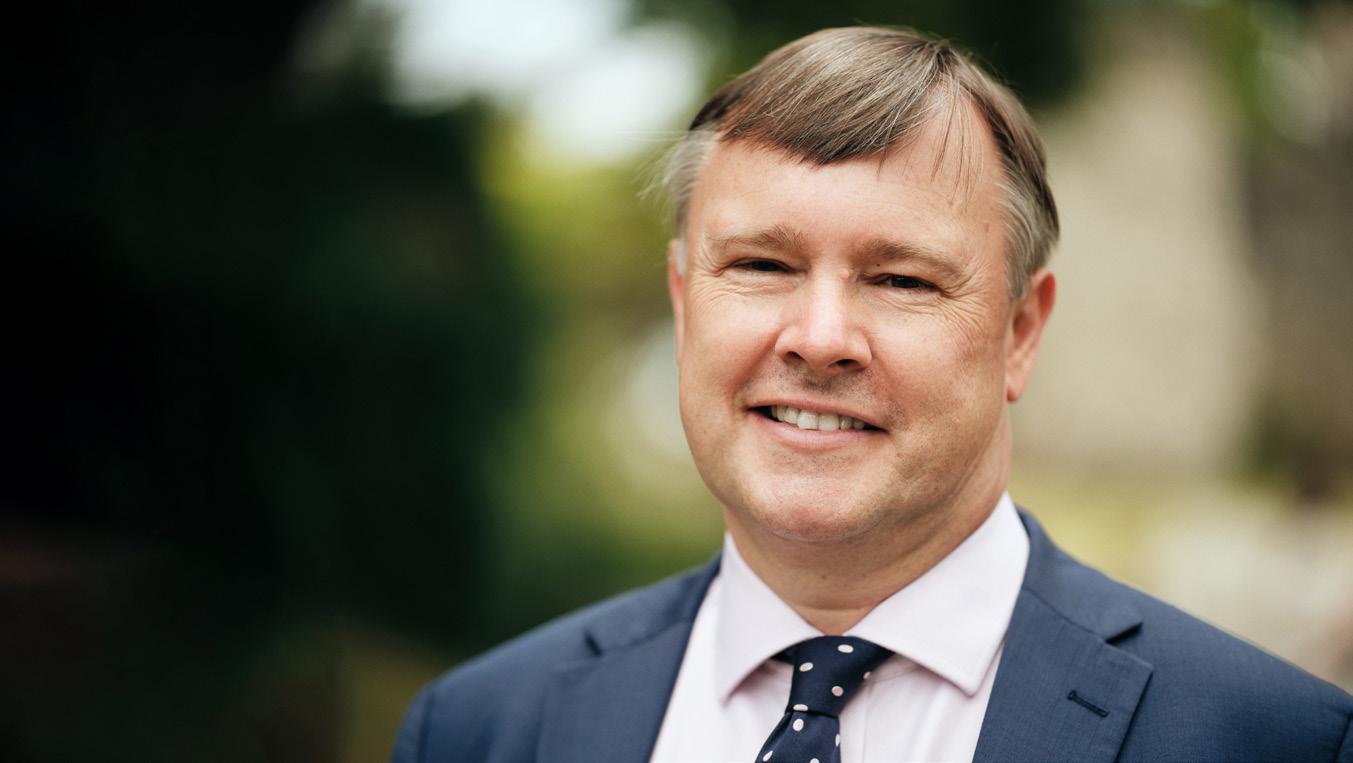
The cost of doing business is ever rising – skyrocketing inflation, a weak pound and global materials shortages – making protecting cashflow as critical as it has ever been, particularly for SMEs.
But all of these problems only increase the likelihood of customers having their own financial issues that lead to late or unpaid bills. With April’s budget setting season on the horizon, it’s vital firms set themselves up for success and have the debt recovery processes they need in place.
It might seem obvious, but the temptation to jump on an opportunity for revenue, without doing the due diligence, is more acute than ever at the moment. But particularly at an economically volatile time, it’s essential to vet new partners, suppliers and customers to make sure they are financially sound before entering into contracts with them.
While there are statutory conditions for late payments, they are lenient, and businesses can weave far more robust conditions intro contracts that more fully protect them. This could include setting out when interest on payments will increase – for example, an increase of 1% for every month a payment is late. Another sensible inclusion is an agreement that the debtor will be liable for legal and agency costs if debt collection services are needed.
Easy, a huggable world. Huggable in the sense that it’s clean, sustainable, and balanced. And for that to deliver it needs corporate finance, investment banking, entrepreneurs, engineers, and the inventions behind it. So, I would like to bring a little bit of that to the planet.
Considering the work I’m doing now, which is trying to create the leading investment bank in climate tech globally, and helping funds and governments to get involved in climate tech and tech development in emerging markets, I hope it converts a lot of people out there to not just be ‘entrepreneurs’ but to be ‘entrepreneurs that make a difference to the planet’.
It’s important to get ahead of payment issues to reduce the likelihood of it snowballing into a significant cash flow issue. Having automated payment notifications set up is a good starting point, so that letters are sent out the moment payments are due, followed by periodic reminders, meaning less time is wasted chasing money owed. It can also facilitate conversations about cash flow, and whether repayment plans need to be in place to take the pressure off a struggling but valued client.
There is no silver bullet when it comes to ensuring customers pay on time. But these simple steps put a business in the best position to ensure money is flowing in and to protect cashflow.
If you need support with debt recovery and protecting cashflow, please get in touch on 01483 543210.
moorebarlow.com
Firms must set themselves up for success when it comes to debt recovery
“AS AN ENTREPRENEUR STARTING YOUR COMPANY, THERE IS A STATUS OF LONELINESS THAT YOU NEED TO BREAK VERY QUICKLY. WHEREAS THE CORPORATE ENVIRONMENT BY DEFAULT IS NOT LONELY, PROVIDED YOU CAN ADAPT TO IT.”
It’s been well-documented that the UK will be in recession during 2023, with other economies around the world also expected to suffer the same fate. Record inflation and high-interest rates continue to make the trading environment tough, whilst lockdowns in China are having a knock-on effect to the global economy. But is the economic outlook for 2023 as bad as first thought? We spoke to several experts to give an indicator of what you can expect this year.
The independent Office of Budget Responsibility (OBR) has warned that the UK is currently in recession and will remain so for the whole of 2023, with the UK economy contracting by 1.4% over the course of the year. A similar-sized contraction is supported by Goldman Sachs’ macro-outlook for 2023, which says there will be a shrinkage of 1.2%. Significantly, however, this figure is well below the other G-10 major economies, with the UK only marginally ahead of Russia, whose economy is expected to shrink 1.3% in 2023. Germany, with a contraction of 0.6%, is the next worst performer among major economies, according to the report.
Goldman Sachs also expects the UK economy to expand by 0.9% in 2024, with Russia and Germany’s economies growing by 1.8% and 1.4% respectively during this time. With the Organization for Economic Cooperation and Development also forecasting that the UK will lag significantly behind other developed nations in the coming years despite facing the same macroeconomic headwinds, there appears to be tough times ahead for the country.
However, according to Andrew Hodgson, Senior Partner, Corporate Finance at KPMG, such an outlook is not so bad when put in the context of past recessions.
He comments: “We think the UK economy is in the midst of a relatively shallow but protracted recession. Overall GDP is expected to fall by 1.7% from peak to trough, followed by a partial recovery in 2024. Despite this, the size of the UK economy will still be below its pre-pandemic level at the end of 2024. But, while the duration of the current downturn may be relatively long, the drop in activity is expected to be mild by historical comparisons.”
Although 2023 might not be a year of economic despair by historical standards, it’s significant that the UK is expected to be one of the worst-hit major economies. This begs the question of whether enough is being done to mitigate the recession. The Bank of England has continuously raised interest rates as it attempts to
tackle high inflation, taking them to 3.5%, the highest point in 14 years. But this appears to be in vain, so could the government do more to help bring them down?
According to Hodgson, the government does not have much power to alter interest rates.
He comments: “Market interest rates are determined by a range of factors: independent monetary policy, risk premia, and the balance between supply and demand for debt. The government has only a limited role in influencing interest rates. Political stability recently has helped bring down uncertainty and reduce gilt yields in the aftermath of the mini budget. But monetary policy will likely remain tight for the foreseeable future to counteract the effects of persistently high inflation. In addition, quantitative tightening (reversal of the Bank of England’s purchases of government debt in the form of QE) increases the supply of gilts and reduces demand, pushing up gilt yields.”
“OVERALL GDP IS EXPECTED TO FALL BY 1.7% FROM PEAK TO TROUGH, FOLLOWED BY A PARTIAL RECOVERY IN 2024. DESPITE THIS, THE SIZE OF THE UK ECONOMY WILL STILL BE BELOW ITS PRE-PANDEMIC LEVEL AT THE END OF 2024.”
Andrew Hodgson
High-interest rates are not the only challenge the UK economy is currently contending with, however. Inflation is at 10.7%, meaning it remains near a 40-year high, but Hodgson believes this could be alleviated by quickly resolving the conflict in Ukraine or a persistent improvement in supply chain pressures.
He continues: “And with a tight labour market, we think that unemployment could remain relatively low, providing important support to incomes. In the short run, government support will continue to mitigate the direct hit, but fiscal space is already limited after a prolonged period of pandemic-related spending.
As such, the government will probably want to limit the amount of support before it causes it to miss fiscal targets that are already very stretching.”
However, Russ Shaw CBE, founder of Tech London Advocates & Global Tech Advocates, says adequate government support for the tech industry is key for generating growth in 2023.
He comments: “Rishi Sunak’s commitment to supporting innovation across the UK is vital. Increasing public funding towards R&D in sectors, such as AI and green tech, signal that the government is willing to invest in the future success of the UK economybut more has to be done to protect the sector and the economy.
“With the capital holding firm as Europe’s leading tech hub, and flourishing regional hubs such as Bristol, Manchester and Birmingham going from strength to strength - the UK tech industry is well positioned to be a catalyst for growth across the whole economy if the government creates the right environment for the sector. Tech businesses are finding it increasingly hard to find and retain top talent, due to the tech skills shortage which costs the economy an estimated £63bn a year in potential GDP.
“To support the UK tech sector and business more broadly, the government will have to increase investment in digital skills training. The UK also needs to double its effort to strengthen ties with major economies, such as India, to create new trade opportunities. With a holistic economic strategy that makes the most of the UK’s strengths, the goal of creating sustainable growth can come within reach even during these uniquely challenging times.”
Although 2023 looks especially tough for the UK, the global outlook does not appear much better. The International Monetary Fund (IMF) is expecting a third of the world
to fall into recession this year, with the firm’s Head, Kristalina Georgieva, saying 2023 will be “tougher” than last year as the US, EU and China see their economies slow and that it will feel like a recession for millions of people living in countries that are not in recession too. According to the World Bank’s Global Economic Prospects Report, the global economy is also “perilously close to falling into recession,” and will grow by just 1.7% this year, which is the lowest growth figure since 1991.
Dr Maria Paola Rana, Lecturer in Economics and Finance at the University of Salford Business School, says this report also confirms the risk of a second global recession within three years.
She elaborates: “Forecasts for 2023 have been revised down for 95% of advanced economies and almost 70% of emerging and developing economies. Growth in advanced economies, in fact, is forecasted to decelerate from 2.5% in 2022 to 0.5% in 2023. While growth in emerging and developing economies (excluding China) is expected to slow from 3.8% in 2022 to 2.7% in 2023. The World Bank has also expressed particular concern for developing and emerging economies, stating ‘weakness in growth and business investment will compound the already-devastating reversals in education, health, poverty, and infrastructure and the increasing demands from climate change’.”
“INCREASING PUBLIC FUNDING TOWARDS R&D IN SECTORS, SUCH AS AI AND GREEN TECH, SIGNAL THAT THE GOVERNMENT IS WILLING TO INVEST IN THE FUTURE SUCCESS OF THE UK ECONOMY.”
Russ Shaw CBE
Rana says this means we could expect the UK to not be an exception when it comes to a tough 2023.
“If anything, the UK economy has additional reasons for concern, such as Brexit-related issues, including even higher inflation and tougher monetary policy, persistent high energy prices, further lockdowns in China, and the possibility that geopolitical tensions escalate,” concludes Rana.
However, Hodgson says a global economic slowdown will have implications for the UK.
He comments: “The global markets have already had a tough 2022, with growth slowing and financial conditions tightening. As a small open economy, the UK is not immune to the slowdown in the global economy. For example, UK exports are particularly sensitive to demand from our main trading partners, which is enough to outweigh any benefits from the weaker currency. Higher uncertainty about global prospects will also depress business confidence and keep a lid on investment.”
One of the reasons for the slowing global economy is China’s response to Covid-19. China previously had a strict lockdown
The latest data from XpertHR shows that pay awards are worth a median five percent in the three months to the end of December 2022. This is equal to the previous month’s figure and more than double that recorded in the same period in 2021 (2.3%). The gap between pay settlements and inflation remains substantial and will likely continue to be so over the coming 12 months.

The Consumer Prices Index rose by 10.7% in the 12 months to November 2022, slightly down from 11.1% in October, which marked a 41-year high. More than a quarter of all pay reviews take effect from January each year and whilst it is unlikely that pay will rise substantially in the coming months, the latest data shows that neither is there any sign of settlement levels dropping to where they were in the same period last year.
policy, but now that they’ve eased lockdown restrictions, there have been reports that hospitals in the country are under pressure due to Covid-related hospitalisations. According to UK-based research company Airfinity, its model estimates cases in China could reach more than three million a day in the first few months of 2023.
Dr Rana comments on the effects of this policy. She says: “Since China is the major producer and exporter of consumer goods in the world, the surge of Covid-19 infections the country is currently experiencing, due to recently lifting the strict restrictions the country had in place, will disrupt the Chinese manufacturing sector even further - at least in the short-term. This is likely to have a further impact on the global supply chain and, subsequently, on the global economy.”
Hodgson elaborates on this: “China is highly integrated into global supply chains. Shortages of even small components can cause bottlenecks and hold up production processes. This is, in turn, driving up inflation. For example, we’ve seen in the UK that a shortage of semiconductors for new cars has resulted in a spike in the price of second-hand cars. Global supply chain pressures have eased recently, although a combination of geopolitical and Covid-related risks mean they are likely to remain a background issue.”
Because of China’s importance to the global economy, their response to Covid in 2023, particularly over the winter months, could be an integral factor when it comes to improving economic outlooks around the world. However, the UK has its own problems to contend with in 2023, and although the incoming recession does not appear to be one of the worst on record, the UK needs to do more if it wants to avoid falling further behind the other major economies in the years ahead.
“FORECASTS FOR 2023 HAVE BEEN REVISED DOWN FOR 95% OF ADVANCED ECONOMIES AND ALMOST 70% OF EMERGING AND DEVELOPING ECONOMIES. ”
Dr Maria Paola Rana
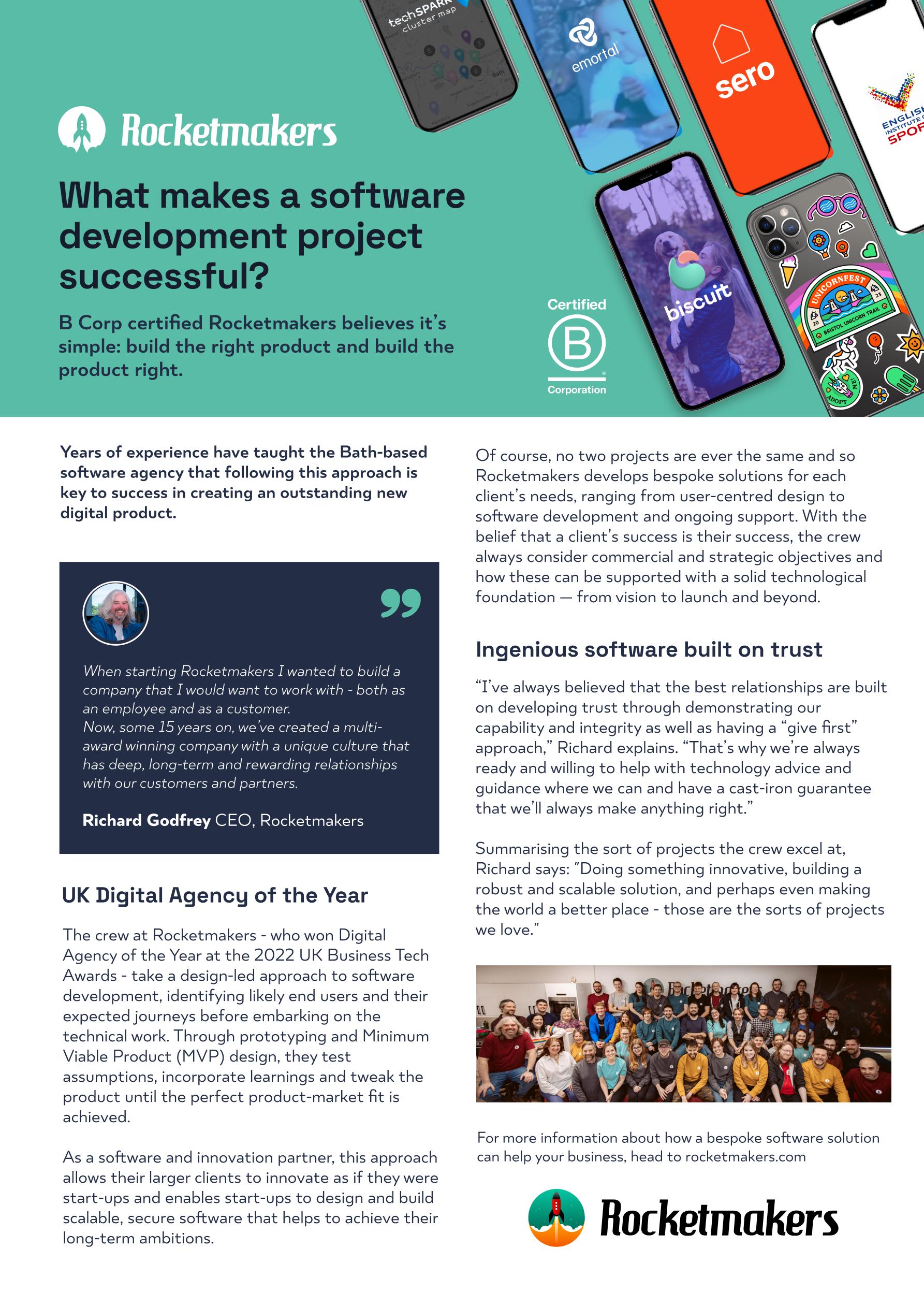

In 2014, Simon Sinek’s cult book Leaders Eat Last shot to acclamation. Sinek highlighted the dynamics that inspire leadership and trust, asserting that for someone to be a leader as opposed to a dictator, they must first take care of their people, and only after should they think of themselves. As leaders, says Sinek, our sole responsibility is to protect our people. In turn, the people will protect each other and advance the organisation.
2022 saw business founders and those in executive and C-Suite positions tasked with making more difficult decisions than ever. Inflation, increased interest rates, hiked energy costs, strained supply chains and a cost-of-living crisis impacted the business world in a myriad of ways, putting pressure on leaders to prioritise long-term
sustainability and potentially cut jobs and bonuses.
That being said, some leaders have continued to receive bonuses and salary increases despite economic pressure, and some argue this is justified due to the economic and social contributions leaders make. Do business leaders deserve to receive bonuses, or should they continue to ‘eat last’, even in the face of economic strain? We investigate…
In the UK, we finished 2022 with an interest rate of 3.5% and an inflation rate of 10.7% - breaking records. A cost-of-living crisis has impacted consumer-spending rates and geopolitical events have caused an
energy crisis and disrupted supply chains. As a result, businesses from a variety of industries have had to re-evaluate where their finances go.
Business founders, CEOs, and those in other C-Suite and executive positions arguably contribute significantly to the business they reside in. Their positions are distinctive in that they offer a unique set of skills and knowledge that would be hard to find elsewhere. This can be compared, for example, to more junior roles or employees with less experience who could be replaced easier.
In the middle of last year, it was reported that the average pay of FTSE 100 managers increased to pre-Covid levels, disappointing some employees, many of whom may be struggling more because of the cost-of-living
crisis. In 2021, CEOs were also paid £3.62m on average, a marked difference from £2.78m in 2020 during the pandemic.
Gerry Lianos, CEO and co-founder of Raffolux, feels that differing pay rise allocations could damage employee motivation, and therefore the overall business. He comments: “During a recession, if it is not possible for both the leader and the staff to receive bonuses, then I do believe that the leaders should ‘eat last’.
“They have a responsibility to ensure the success of their company, and negative sentiment throughout a firm caused by unfair pay allocations can be far more damaging than a leader - even a good one - not receiving their proper bonus for a period. Any available finances to be put towards bonuses should be distributed in reverse, with base-level employees receiving the highest proportion of their usual bonus, and leaders receiving the least (or none).”
It can’t be denied that the size of a business matters when considering whether leaders should eat last. In a small business, every role matters as every individual has a notable amount of responsibility and ownership over their work in a way that likely doesn’t exist to the same extent in a large organisation. Therefore, justifying the importance of a founder or CEO over other roles in the company is harder to do.

While founders of small businesses and start-up companies tend to take modest salaries at the beginning of their firm’s growth anyway, with the main goal typically being to scale their business out of passion.
Riannon Palmer, founder and Managing Director at PR company Lem-uhn, feels that it’s important for businesses to be conscious of the ‘public mood’ from a PR perspective. She comments: “In terms of leaders of big corporations taking big pay rises and bonuses, the story is a little different. Larger companies aren’t as dependent on profits to secure pay rises for the big bosses. But companies must take into account the public mood. If the company is performing well, all employees should benefit, not just the CEO. Similarly, if the company is going through a downturn, then all employees including leaders should have equal treatment.
“Employees are at the heart of any company and companies need to look after them, or risk them leaving. From a PR perspective, bosses taking big raises and bonuses are also vulnerable to bad press not just for them but for the business too.”
David Rajakovich, serial entrepreneur and thought leader, echoes the sentiment
that the larger the organisation, the more they need to pay attention to public opinion and reaction. He says: “The larger the organisation, the more of a media spotlight there will be on them. Therefore, they need to be careful about how this plays out in the court of public opinion because CEOs of larger organisations are political by nature. Whereas for founders and earlier-stage business owners, this is less of a concern – it’s more about considering how you move your business forward.”
Indeed, the performance of a business also matters when determining whether higher positions deserve more remuneration for their work. From a founder’s perspective, the performance of their company is likely to determine how much of a payoff they receive at the end of each year. Despite this, some founders may want to maintain their salary, even if their business suffers from external pressures, which may lead to them making financial cuts in other areas of the business.
In contrast, if a company is in the lucky position of experiencing growth in an economic crisis, it might be more likely that a founder will give themselves and company execs a pay rise. However, some founders, especially those in retail and consumerfacing businesses, have needed to take a pay cut despite growth, as the cost of supplies and materials has gone up, leading to tighter profit margins. Nevertheless, some argue that if a business is performing well, it’s a result of everyone’s work and therefore, every employee should be paid, not only those in exec-level positions.
Palmer continues: “As a solo founder, the majority of my pay comes from company profits. This means if the company doesn’t perform well, I earn less. I see the argument from both sides. Being the leader, the company’s performance is ultimately determined by you. However, this means
you also have the pressures that come with this. Furthermore, founders tend to be always on, working a lot more hours than our employees.”
Businesses are arguably the fabric of any capitalist society. Therefore, many claim that those individuals who keep businesses running contribute immensely to society and the economy as innovators and job creators and should be paid in alignment with this no matter what.
Economic crisis hurts every aspect of society, but an economy strengthens from growth in a workforce, strong productivity and rising exports, all of which are determined by the leadership of founders and those in exec-level positions. Arguably, leaders contribute a lot to society, and if we are to achieve a strong economy once again, perhaps an incentive through bonuses and pay rises for founders and execs is justified.
Lianos continues: “Of course, there is an argument that a leader creates opportunity and so deserves to be paid despite market conditions. There seems too often to be an assumed principle behind questions of this nature that if a leader benefits from a pay rise, then this must be at the expense of the employees.
“Leaders who perform well elevate the performance of the entire firm, and if that has led to the facilitation of a structure where people can be remunerated well and earn pay rises and meaningful promotions, then why should they not share in the benefits of their work?”
Meanwhile, Rajakovich feels that the type of business leader determines whether bonus remuneration is awarded. He comments:
“We have to separate the truly innovative leaders who are driving business value for their businesses and ones that are more like caretakers who are going with the status quo.
“IF THE COMPANY IS PERFORMING WELL, ALL EMPLOYEES SHOULD BENEFIT, NOT JUST THE CEO. SIMILARLY, IF THE COMPANY IS GOING THROUGH A DOWNTURN, THEN ALL EMPLOYEES INCLUDING LEADERS SHOULD HAVE EQUAL TREATMENT.”
Riannon Palmer
“WE HAVE TO SEPARATE THE TRULY INNOVATIVE LEADERS WHO ARE DRIVING BUSINESS VALUE FOR THEIR BUSINESSES AND ONES THAT ARE MORE LIKE CARETAKERS WHO ARE GOING WITH THE STATUS QUO.”
David Rajakovich
“Through their own intellect and ability to make things happen, business leaders who are highly innovative have driven business results relative to their market and peers, and should be rewarded for this in the form of bonuses and pay rises. However, they shouldn’t if they’re coasting and doing just as well or worse than their peers.”
WHAT WOULD SINEK SAY?

From Sinek’s perspective, a leader ‘eating first’ could have varied consequences. For example, a leader putting themselves first, Sinek believes, has the potential to materialise into a dictatorship which

could have dire consequences for a firm’s growth. He says that the best organisations don’t view individuals as commodities. This is because, when a leader puts their employees first, their workforce gives them everything they have to help the organisation grow.
Despite this, there are some very evident and convincing reasons why business leaders deserve additional remuneration based on their effort and knowledge, even in an economic crisis. However, a business’s size, performance rate and a founder’s attitude all come into play when deciding.
Either way, a strong economy is bolstered by great businesses with great people leading them and pay rises and bonuses may work as effective rewards and incentives, helping to build our economy sooner rather than later.
“THERE IS AN ARGUMENT THAT A LEADER CREATES OPPORTUNITY AND SO DESERVES TO BE PAID DESPITE MARKET CONDITIONS. THERE SEEMS TOO OFTEN TO BE AN ASSUMED PRINCIPLE BEHIND QUESTIONS OF THIS NATURE THAT IF A LEADER BENEFITS FROM A PAY RISE, THEN THIS MUST BE AT THE EXPENSE OF THE EMPLOYEES.”
Gerry Lianos
With the rise of social media in recent years, the influence of business leaders is no longer limited to boardrooms, the industry they operate in or the consumers they serve. There’s a whole new world available to be influenced: the online one. So, for our latest top 32 list, we’ve looked at the top business influencers.

HOW HAVE THE TOP 32 BEEN CHOSEN?
Each entrepreneur is based in the UK and has already made their name in the business world prior to becoming an influencer on social media. They are also popular in the online world due to their expertise on a particular subject or range of topics.
However, if you think that someone is missing from our list, please send an email to editor@businessleader.co.uk and they will be added to the digital version on businessleader.co.uk
This list is in no particular order.
Brendan Beeken has a successful background in financial services, marketing and motorsport. He is the former CEO of MSL Motorsport Consultancy, the Founding Director and Chairman of cryptocurrency exchange and social platform Moni Talks, as well as an investor, mentor and strategist.
The Isle of Man-based entrepreneur also treats his 5,000+ LinkedIn followers to regular insights into the worlds of crypto and fintech, providing them with a wide range of business tips that have been formulated over a 25+ year career.
Lucy Martin founded Marcus Venture Consulting in 1998 and still serves as the company’s CEO today. In addition, she is the Chair of the Board of Directors at regional theatre Oxford Playhouse and a Professor of Leadership and Governance at IE Business School.
With just shy of 1.1 million followers on LinkedIn, she’s also one of the UK’s top voices on LinkedIn. In addition to posting stories that she finds moving or amusing on the platform, she regularly offers her opinion on news, ethics, economics and corporate governance.
Originally making his name as the co-founder of Social Chain, a social media marketing company with revenues of around £532m, Steven Bartlett is the youngest-ever investor to be named on Dragons’ Den and a Sunday Times best-selling author. Bartlett is also known for running Europe’s most downloaded business podcast, The Diary of a CEO, which has featured a wealth of high-profile guests, such as Sir Richard Branson and comedian Stephen Fry. With just shy of a million followers on LinkedIn and 2.2 million followers on Instagram, Bartlett also shares his unique business insights with a huge social media audience.
A former leader of several blue-chip companies and high-growth start-ups, including Nigeria’s largest mattress/bedding company, Mouka, Peju Adebajo is currently an Independent Non-Executive Director at Wolseley UK, the plumbing, heating, and cooling trade merchant. Although, she also works in a variety of other nonexecutive roles.
Named one of the Top 10 Green Voices in the UK in 2021 on LinkedIn, Adebajo is passionate about environmental, social and corporate governance, and regularly shares her expertise on these topics with a following of more than 10,000.
Before becoming a well-known business influencer, Brad Burton founded 4Networking Ltd, a business networking platform that hosted 68,000 events before Burton decided to sell all his business networking interests in 2022.
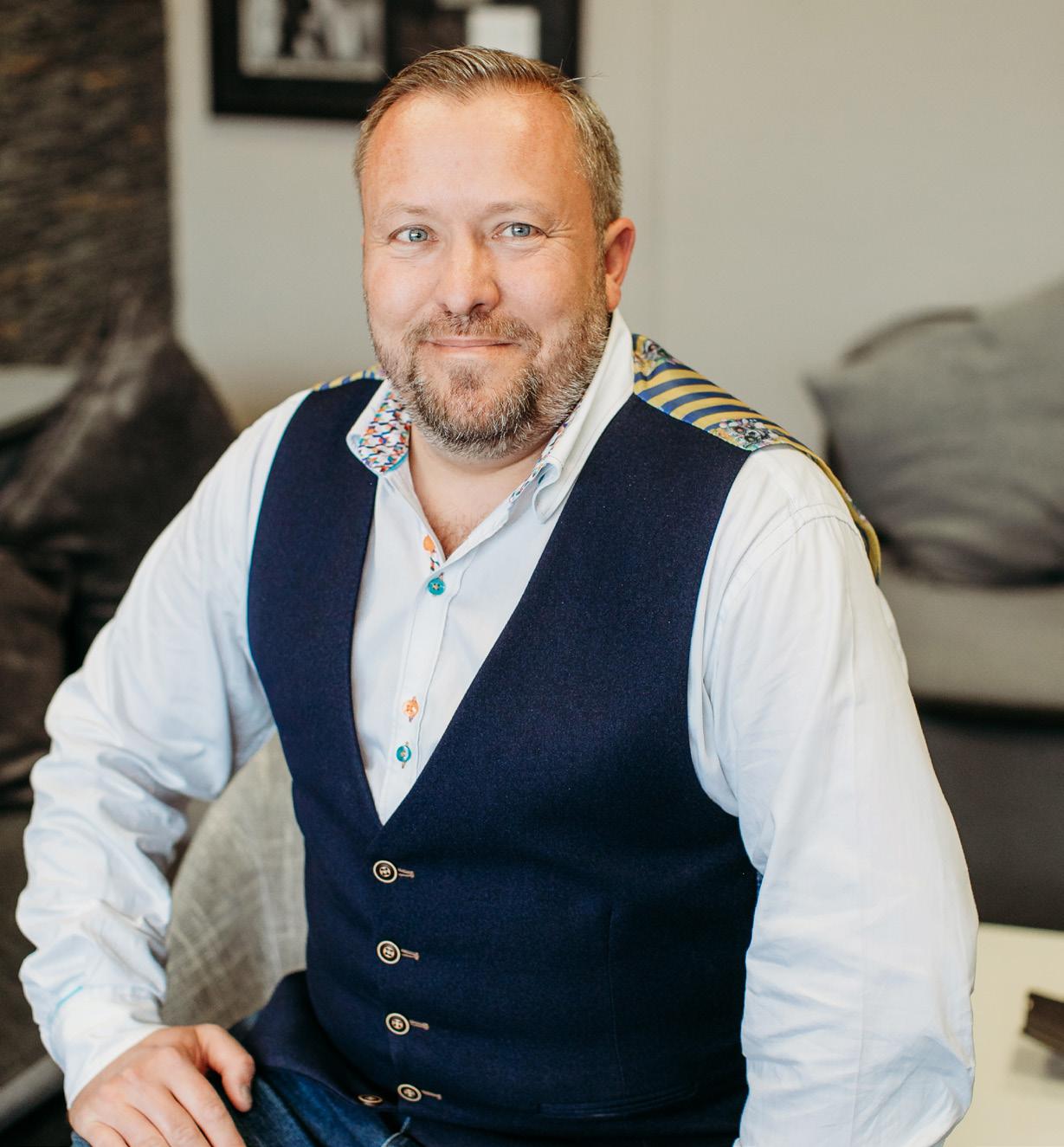
Burton has also been a motivational business speaker since 2008 and has the honour of being the highest-rated motivational business author on Amazon. He also regularly shares stories of his fascinating life and what he’s learnt from it to help motivate his sizable social media following.

THE UNSCHOOL OF DISRUPTIVE DESIGN
Leyla Acaroglu is an award-winning designer and founder of The UnSchool of Disruptive Design, an experimental knowledge lab for creative rebels and change agents, which she has led since its inception in 2014.

With her expertise in education, sustainability, the circular economy and social innovation, not only is she one of the top influencers in these topics on LinkedIn, but she even teaches them via LinkedIn Learning
APS INTELLIGENCE
Ranked one of the Top Voices 2020: UK Influencers on LinkedIn, highly respected organisational psychologist and best-selling author John Amaechi OBE discusses a wide berth of topics on the platform, ranging from leadership tips and entrepreneurial advice to why he made the decision to come out publicly.
But before establishing himself as a leading LinkedIn influencer, the former professional basketball player founded APS Intelligence, a multifaceted strategic consultancy solution in 2007. He also serves as NED of a FTSE 250 company, was a 10-year director of the UK’s largest healthcare organisation and a board adviser for several FTSE 100 organisations.
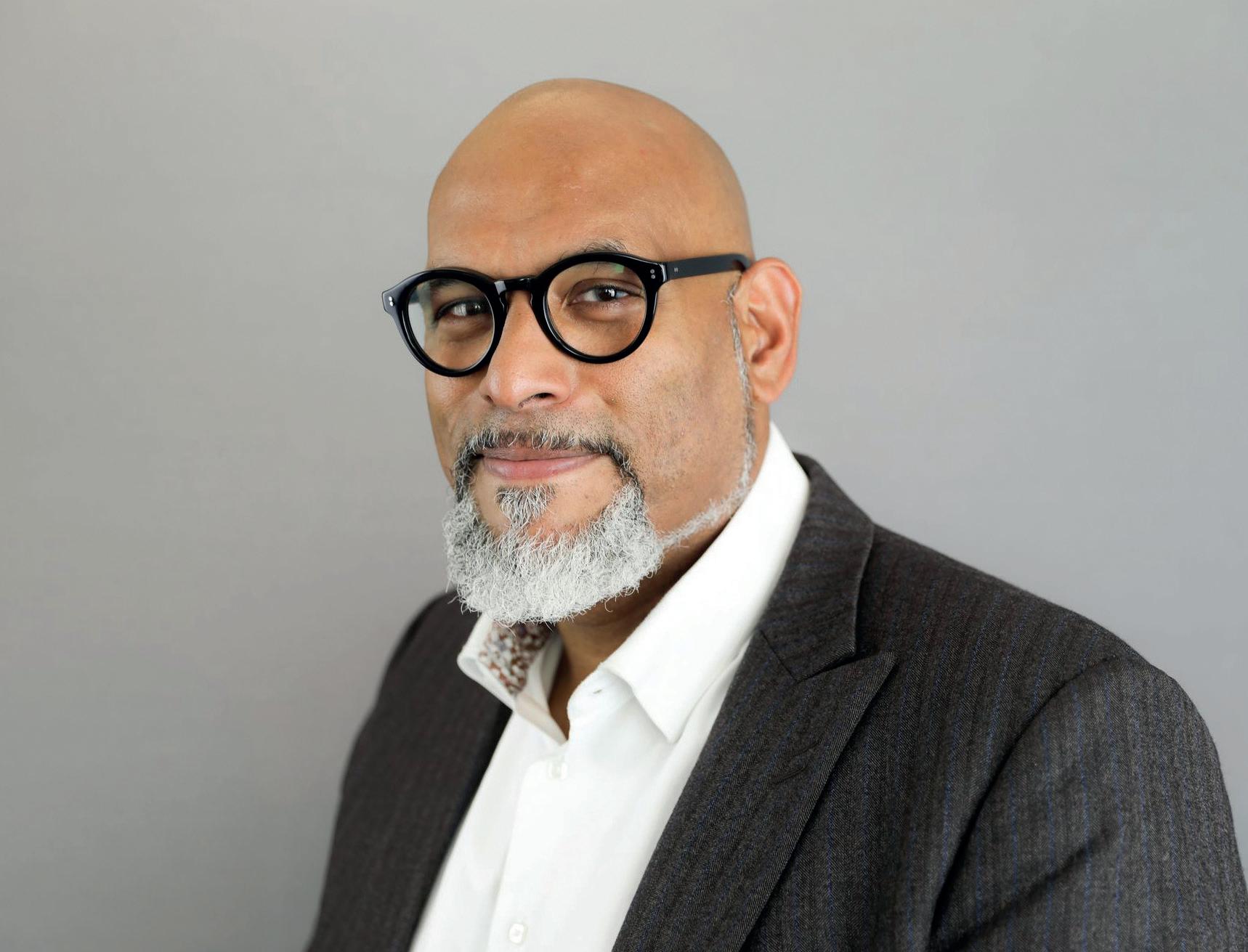
3 HEADS AGENCY
Ross Testa is the founder and Director of creative media agency 3 Heads Agency. Since founding the company in 2018, Ross has gone on to work with a wealth of highprofile clients including Lord Sugar, Lego and Silverstone Racetrack, and featured in interviews with Forbes and the BBC.

The young entrepreneur also regularly treats his sizable LinkedIn following with posts of his entrepreneurial journey and provides insights into some of the work he and his team do for their clients.
On LinkedIn, Harriet Green often shares the inspiration she’s found in hobbies and opens conversations with aspiring business leaders. Currently ranked as one of the UK’s Top Voices on the platform, she also promotes inclusion and celebrates women that have inspired her with her 67,000 followers.
Prior to her involvement in the online world, she enjoyed a long and distinguished business career, which included roles as the Group CEO of Thomas Cook and CEO of Premier Farnell, although she currently works as the Executive Chair at social mobility ecosystem Mission Beyond.
The former CEO of Transaction Banking at ABN AMRO Bank, Ann Cairns is the current Executive Vice Chair at Mastercard and serves on the boards of various other companies, although her impressive business career also includes a spell as a NonExecutive Director at AstraZeneca.
Ranked as one of the Top Voices on LinkedIn in 2020, Cairns often shares articles, thoughts and ideas that focus on creating a better world for everyone through technology, innovation, partnerships and advocacy.

Katy Leeson is the CEO of Relentless Group’s media division, which is the investment business owned by former footballer and Sky Sports pundit Gary Neville. However, Leeson’s distinguished career in media includes more than five years as the UK Managing Director of social media marketing agency Social Chain.
Ranked one of the Top Voices on LinkedIn in 2020, Leeson has more than 68,000 followers on the platform who know her for mental health advocacy and her insightful tips on leadership and workplace culture.
With nearly 20 million followers on LinkedIn, Richard Branson is one of the most followed on the platform and he regularly treats his mass following to business advice, discussions on dyslexic thinking and even glimpses of what he likes to do in his spare time.
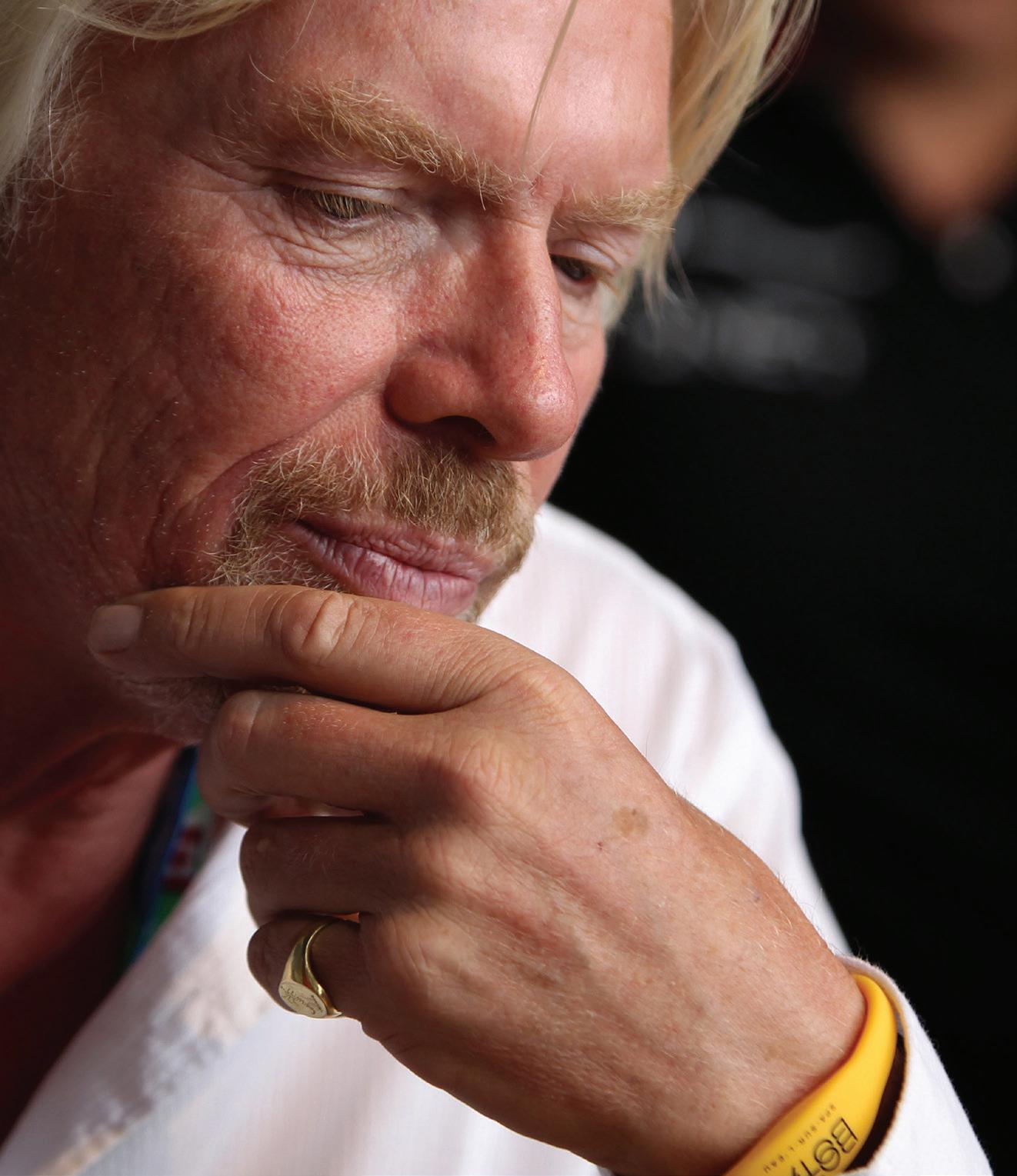
Without question one of the world’s most famous entrepreneurs of all time, he founded the Virgin Group back in 1968 and has grown it into a business behemoth operating in a wealth of sectors from mobile phones to health and wellbeing.
Currently working as a Non-Executive Director for the UK Infrastructure Bank, Nigel Topping is the former CEO of WE MEAN BUSINESS, a coalition that works closely with leaders from the business and policy community to accelerate action on climate change.
As the UN Climate Change High-Level Champion for COP26, Topping is, unsurprisingly, a big advocate for combatting climate change. He made the list of the UK’s Top 10 Green Voices on LinkedIn in 2021 and has a sizable following of nearly 35,000 on the platform.
Alan Furley founded talent consultancy ISL Talent in 2008, and as the company’s CEO, has led the Bristol-based firm to inclusion on the Great Places to Work list three times. Alan is also a renowned business advisor, mentor and public speaker.
With nearly 20,000 followers on LinkedIn, the recruitment specialist regularly discusses current employment and HR trends, provides tips for helping employers attract and retain talent, and more.

HR REWIRED
One of the UK’s most well-known HR consultants, bestselling author Shereen Daniels has more than 87,000 followers on LinkedIn. She uses the platform to highlight the experiences of Black professionals in the workplace and seeks to help organisations become comfortable with the uncomfortable when it comes to conversations about race and equality.
Before amassing her sizable online following, Daniels headed up HR at the Metropolitan Pub Company and then Caffè Nero. Today, she is the Managing Director of HR rewired, an advisory firm specialising in anti-racism and racial equity.

The daughter of Virgin’s founder, Holly Branson currently works as the company’s Chief Purpose and Vision Officer, but also serves as the Chair of Virgin’s not-for-profit arm, Virgin Unite. She also co-founded Big Change, a partner to various charitable projects, in 2012.
Although she uses LinkedIn to share updates from Virgin’s various companies, Branson is known for talking about leadership and entrepreneurship, and a range of causes that are important to her, such as gender and racial equality.
Building businesses since 1985 when he founded executive headhunting firm Alexander Mann, James Caan CBE has also founded management advisory firm Hamilton Bradshaw and serves as the Chairman of Seed Capital investment company Recruitment Entrepreneur.
Caan also boasts a whopping 3.4 million LinkedIn followers and provides them with career tips and various business insights from a recruitment expert and serial entrepreneur. He also engages with his huge following to find out more about what they want from their careers.
Somi Arian founded Smart Cookie Media, which aims to help established brands stay relevant in the modern digital age, in 2015, and has served as the company’s Managing Director since its inception. She is also the founder and CEO of the Web3 education platform InPeak.

In addition to posts on the metaverse, NFTs and Web3, her sizable LinkedIn following of more than 81,000 followers is treated to Arian’s insights on digital transformation and how women can achieve greater prominence in the worlds of business and technology.
The founder and former CEO of PeerIndex, a firm that helps businesses to identify who and what is influencing their customers, Azeem Azhar has worked as an advisor and mentor and served on various company boards over the past twenty years.
As far as influencing goes, Azhar launched his own podcast, Exponential View, in 2015 and often shares his opinions on blockchain, climate tech and venture capital with his 425,000-strong LinkedIn following.

With 200,000 followers on LinkedIn, many are familiar with Theo Paphitis through the business advice and posts about dyslexia that he shares on social media.
However, the former Dragon made his name in the business world as Chairman of his eponymous retail group, a position he has held for more than 27 years. Many also know Paphitis for his 3,500-strong business network, Small Business Sunday, and as the former Chairman of Millwall FC.

A former Director of Brand & Communication at Deloitte, Lisa Unwin is the co-founder and Chief Executive of Reignite Academy, a company set up to help lawyers navigate successful long-term careers.
She is passionate about helping women have sustainable, fulfilling and rewarding careers and this is reflected in the content she posts on LinkedIn, where she has previously been ranked as one of the UK’s Top Voices on the platform on more than one occasion.
A former Dragon on BBC’s Dragons’ Den, Tej Lalvani has been the CEO of leading vitamin company Vitabiotics since 2015. During his tenure as CEO, he led Vitabiotics to a Queen’s Award for Innovation in Vitamin Research in 2018, meaning the firm became the first vitamin company to receive the award twice. With just shy of 340,000 followers on LinkedIn, Lalvani regularly provides tips for success and entrepreneurial insights to a very impressive following.

Ranked as one of the UK’s Top Voices on LinkedIn five times, Carol Stewart is one of the most decorated influencers on the platform. She is widely known for challenging gender and racial inequality and for her inspiring posts on female and introverted leadership. Stewart also hosts the Quietly Visible Podcast which goes into more depth on the latter topics.
However, as the founder of Abounding Solutions, Stewart has been coaching female executives and senior leaders to raise their visibility and achieve their goals for many years.
One of the Dragons on BBC’s Dragons’ Den, Sara Davies MBE started crafting product retailer Crafter’s Companion from her university bedroom in 2005 and has gone on to grow the platform into all of Europe and the US. The multi-award-winning entrepreneur and MBE recipient also invests in and advises many other firms.
Davies has just shy of 300,000 followers on LinkedIn and regularly provides glimpses into her personal life on the platform, whilst also discussing women in business and life as an entrepreneur.
Serial entrepreneur Timothy Armoo started his first company, EntrepreneurXpress, at just 17, and went on to sell the business. He has since founded the marketing company Fanbytes, which was acquired by Brainlabs in one of the biggest deals in the industry in 2022, and still serves as the company’s CEO.


An investor that was previously featured on Forbes’ 30 Under 30 list, Armoo is also widely known by his 62,000+ LinkedIn followers for his insights on how marketers can reach Gen Z and his personal tales on the realities of running a business as a young CEO.
Prof. Amanda Kirby is the most active neurodiversity campaigner on LinkedIn. With around 50,000 followers on the platform, she regularly shares facts and research relating to dyspraxia, dyslexia, ADHD and other forms of neurodiversity, and outlines the business case for hiring neurodiverse talent.
In addition to her role as Honorary Professor at Cardiff University, Kirby has also served as the CEO of Do-IT Solutions, a tech-forgood company that she helped co-found back in 2012.
Matt McNeill Love is the co-founder and Chief Operating Officer of Thursday, a dating app that despite only working on the day of the week that it is eponymously named, McNeill Love and fellow co-founder George Rawlings have managed to make a success.

One factor behind Thursday’s remarkable success story is its incredible knack for marketing. Thanks to quirky PR stunts that have gone viral and guerrilla marketing tactics, the dating app has made its name disrupting the norm in a competitive market and become one of the UK’s most talked about brands.
An expert in retail, Richard Lim is the current CEO of Retail Economics, an independent economics research consultancy focused on the UK consumer and retail industry. His distinguished career in the sector also includes seven years as Head of Retail Insight and Analytics at The British Retail Consortium.
Lim uses the retail industry knowledge he’s built up over the years to share data and insights and provide regular updates on the retail industry to his LinkedIn audience of more than 9,000 followers.
The current Global CEO of iconic luxury fashion house CHANEL, Leena Nair spent more than 30 years at consumer goods giant Unilever, working her way up the company to become its Chief Human Resources Officer. She was also a Non-Executive Board Member at telecoms giant BT until last year.
Nair is widely known for her exploits on LinkedIn, where she often shares life lessons, business insights, HR tips and leadership advice. She even used to publish a monthly newsletter, ‘Learn With Leena’, on the platform.
Although Lynda Gratton has helped train generations of business professionals as a Professor of Management Practice at London Business School for 34 years, she’s also used her incredible business expertise to create HSM Advisory, a research advisory group, and successfully run it as CEO for more than 15 years.
As a business influencer, Gratton is known for sharing tips online about how to prepare for the future of work, a subject on which she has written multiple books, and won awards for.
Ben Francis is the CEO of Gymshark, a fitness apparel and accessories brand that he founded back in 2012 and led to a unicorn valuation in 2020. He also founded and is a former Director at clothing brand Manière De Voir.

With more than 440,000 followers on LinkedIn, Francis has a remarkable following, and his posts on the platform include everything from men’s mental health to insights into his own personal and professional journey.
Cindy Forde is an author, speaker and the founder of Planetari, a multi-disciplinary education platform that empowers children to be the innovators and entrepreneurs who build a better world.
The former Cambridge Science Centre CEO has dedicated her career to transforming how we understand and act as human beings towards the Earth. An important distinction with Forde’s online posts, however, is how she draws attention to the importance of ensuring greater diversity in the conversation around the climate crisis.

Two volunteer mentors for the Help to Grow: Management Course give their account on the challenges facing small businesses and how mentoring has benefited their mentees and themselves.
 MARK BERNARD Director
MARK BERNARD Director
The Ruppell Club Ltd
Can you tell us about the Help To Grow: Management Course and how it helps small businesses to grow?
In today’s world, where competition is crazier than ever - the need for a smart, imaginative and robust plan to develop and grow your business is more acute than ever.
And let’s be honest, get it wrong and the risk of stagnation, decline or even failure increases significantly, which is why the Help to Grow: Management Course is so brilliant and so helpful. It provides a unique and powerful set of workshops, networking and mentoring, all of which are based on real experiences and out of which participants will develop a Growth Action Plan tailored specifically to the needs and requirements to their business.
What are the main challenges you are seeing businesses face today?
The macro-level challenges for small businesses in 2023 are well known: continuing high inflation and associated economic downturn, the gathering pace of digital transformation, data & device security, and stepping up to embrace the sustainability agenda are at or near the top of nearly everyone’s agenda.
These are ever-present for anyone running a business and just the reality of where we are right now. For a small business this creates a number of operational problems and how to remain agile is one of the biggest.
How have you benefited from being a Mentor for the Help to Grow: Management Course?
As a mentor on the Help to Grow: Management Course, my role is to be an independent sounding board and support course participants as they work towards individual goals and their own Growth Action Plan, but also to help them to become as effective as possible on their overall development journey.
The really great thing about mentoring on this course is having the opportunity to share some of what I have learnt with small businesses, who are the lifeblood of the UK economy, to help them move forward. And right now, with what looks to be a very difficult road ahead for all businesses over the next 12-18 months, that has never been more important.
Helping the next generation of businesses to become the best version of themselves that they can and to be more successful is about as good as it gets. But more than this, the mentoring relationship is definitely mutually beneficial with both mentee and mentor learning from each other.
SARAH PASCARU Social Media Consultant & Trainer Social JooceCan you tell us about the mentoring, the Help to Grow: Management Course and how it can help small businesses to grow?
The Help to Grow: Management Course mentoring is a great way for business owners and leaders to stop and look at their businesses. They work with mentors who share their knowledge, experience and connections within a particular field. What are the main challenges you are seeing businesses face currently?
Some of the main challenges businesses face are increasing costs, managing cash flow, and generating revenue. This can stop companies from investing time and money into improving and moving their business forward. Social media marketing is one common area that goes down the priority list, but this can also affect brand awareness and the opportunity to attract new customers.
What success have you seen from businesses engaged in the Help to Grow: Management Course?
I’ve seen businesses gain clarity and confidence from the mentoring programme. They were interested in a sounding board, someone to listen to and guide them. Businesses were also keen on hearing a fresh perspective on some aspects of their business and working through challenges together to achieve their goals.
The last two years have changed everything. For companies. For leaders. For employees. Anxiety about workers being replaced is rampant.
The pandemic brought the future of work forward to today; with the new work patterns we formed in crisis becoming our next normal. What will jobs look like in a few decades and what skills will be in greatest demand? Will technology outdo jobs and exacerbate inequality, or produce more meaningful work and improved societies?
Concern about a “jobless future” has never been greater. Seemingly every day, an academic, researcher, or technology leader suggests that in a world of automation and artificial intelligence (AI), workers will increasingly be a surplus to what businesses need.
The Covid-19 pandemic caused the world’s greatest-ever workplace experiment as businesses were driven to mobilise their workforces almost immediately from officebased work to home working with very little warning or preparation.


Current trends in business and technology show that the way employees work — where, when, why, and with whom — have and will continue to change over the next decade, bearing little resemblance to work as it stands today.

During uncertain times, technology has been an enabler for individuals, companies, and communities. It has facilitated new ways of working, and kept the economy buoyant. Tech has also been an important source of job creation as we return to a sense of normality. Nevertheless, we are not returning to the economy, or the labour market that we left in 2019.
“The Future of Work is characterised by complex technology, including artificial intelligence, networked ways of working and a focus on new skill sets. This brings into focus the re-drawing of knowledge boundaries”, according to Professor Juani Swart, Prof Human Capital Management, at the Future of Work Research Centre, University of Bath.
Technology is changing our lives in ways we could not have dreamed of only a few years ago, and these same technologies are also re-modelling work and how we operate and cooperate. This will have major implications for underlying business models and the way in which work is organised. To future-proof employees’ capability to work, they will need new skills – but which ones?
Drones and robots may be replacing humans in the workplace, but here are some great gigs you can look forward to in the coming years.
Workforce upskilling is one of the significant HR trends of the past few years. In 2030, it’s highly likely there will be jobs that don’t
even exist yet. The world of work is evolving quickly, which means you have to figure out how to prepare for a future job role that’s impossible to predict.
However, there are sets of skills that are important now and will continue to be in the future. These include communication skills, digital and data skills, application of knowledge skills, people skills, and mental processes, according to Understanding Current and Future Skills Needs Policy Report.
97 million new roles will be created by 2025 as humans, machines, and algorithms increasingly work together, the World Economic Forum predicts. Employers expect to offer reskilling and upskilling to just over 70% of their employees by 2025, according to the Forum’s Future of Jobs Report 2020. An average of 66% of employers surveyed for the report also expect to get a return on their investment in upskilling and reskilling within one year.

“Professional roles are moving more towards social interactions, which replaces some roles which have been influenced by digital transformation. In summary, it is the creative and human aspects of work which take centre stage,” adds Swart.
The need for manual and physical skills, as well as basic cognitive ones, will decline, but demand
and higher cognitive skills will grow. Looking ahead, the most beneficial work will be cognitive in nature. Employees will have to apply creativity, critical thinking, and constant digital upskilling to solve complex problems. Employees must consistently refresh their digital dexterity to meet new needs.
Business is under mounting pressure to become lean and agile. While employees’ skillset must adjust, likewise, leadership must shift - in terms of approach and abilities.
Leadership skills such as empathy, selfawareness, communication, and emotional intelligence are becoming more important, and others, for instance, confidence, are evolving to stay relevant for the times.
Managers will need to be flexible thinkers, skilled in guiding people through change, able to unite a diverse team in scattered locations, and capable of maintaining excellence in communication.
Social skills are taking centre stage. They are more than a conversational approach to interaction with others. Today, it must include an understanding of the social nature of work in a time of new work technologies, an always-on workforce, and the new pressures of network-centric work patterns.
So, today's leader must have social skills that transcend empathy and communication and create an environment based on those social skills.
Successful leaders have a blend of skills that combine interpersonal communication, emotional intelligence, and a tech-savvy mindset.
Will Gosling, UK Human Capital Practice
Leader at Deloitte explains that future business leaders need to think about how they can drive transformation.
“This includes the ability to communicate a clear vision, motivate a team, focus on core values, and act as a mentor to help their team adapt to the challenges brought about by the future of work. In addition to these skills, leaders in hybrid workforces will need to prioritise seamless communication with employees by using collaborative technologies that enable good team dynamics, whether in an office environment or elsewhere”, according to Gosling.
“Business leaders also need to build and develop the skills required for change and adaptation to succeed in an increasingly uncertain and complex organisational and societal environment. For example, leaders will be required to display greater flexibility and trust as individuals seek new opportunities beyond their typical job role”, he adds.
Leaders might feel as if they’ve been hurled onto another planet, coping with so much change and uncertainty, but with the right skills they can keep up. There may be hesitation and trepidation, but there’s no going back. A little secret sauce in the form of future skills will help to sweeten the journey.
Experts say we are living through the Fourth Industrial Revolution, and 65% of children entering primary school today will ultimately end up working in completely new job types that don’t yet exist, according to the World Economic Forum. With the rise of automation, AI, and robotics, all the signs suggest that the next decade will be one of

Future skills are important because they equip people to cope with the ongoing shift in mindsets in the workplace and prepare for the rapid onset of technological advances. How can we thrive in an AI-first world? The answer is to become more human. Qualities such as agency, commitment, empathy, and perseverance will become more valuable in the workplace.
At Davos 2022, Microsoft Chief Executive Officer Satya Nadella spoke about leaders changing roles and how technology businesses can help protect people. When asked what is that leadership quality that each of us has to build more muscle in, he responded:
"It's that caring, because the reality is, all of us are going to have tail events that are going to be different. I think we have to realise that that ability to be in other people's shoes, have a sense of caring, that’s probably one of the most important things."
Gosling identifies that there has been real growth in the appetite for access to data and evidence-driven insights.
“This could feasibly lead to roles that are focussed on increasing connectivity of data sources across organisations, which will be supported through leveraging data platforms, as well as further understanding the data capabilities of existing technology solutions.”
With an increased appetite for automation, we will see more roles that are delivering automation across business functions in the future. According to Gosling, there will be an
“There are numerous tools and products in the market that support, with introducing AI and automation into the workplace and it can be expected that there will be roles required to ensure these are embedded and used effectively”, he says.


Also, the metaverse is coming — or rather, it is already here. The idea of virtual worlds has been around as far back as the 90s, if not earlier, and more than $10bn (£8.4bn) has already been invested in the metaverse by Meta Reality Labs. It is predicted that 10,000 jobs will be created over a five-year period and the market size is estimated to be $800bn (£671.6bn) by 2024. That is a lot of growth!
The demand for technology-related skills is growing steadily – the European Commission estimates an annual increase of four percent – and the supply is clearly insufficient, as shown by the fact that last year the European market suffered a deficit of 756,000 ICT experts. New innovative technology has a crucial part to play in transforming employee experience, connection, and inclusion at work, according to Meta’s research.
“Technology will be brought in to create better opportunities for employees and lessen the day-to-day pain points involved in remote work”, wrote Brynn Harrington, VP of People Experience at Meta, in the report.
“The number of job vacancies relating to the metaverse has sharply increased in recent times. These jobs relate not only to building the infrastructure associated with the metaverse but also translating areas of
“And, by definition, it will require countless people to work countless jobs to get anywhere near its grand ambitions.
So, while technology is poised to eliminate millions of current jobs, it will also create millions of new ones. While big change is coming, a little advance planning — by workers who stand to be replaced and the companies that employ them — goes a long way.
No one has a crystal ball that can tell exactly what skills will be needed and what won’t. However, cognitive flexibility, digital literacy, solid decision-making skills, emotional and social intelligence, and a creative and innovative mindset will stand the test of time and be crucial to future job attainment.
SHOULD YOU BE WORRIED?
If you do a job at risk of disappearing in the next decade, you might be worried. But historically, technology creates more jobs than it destroys and rarely does technology eliminate entire jobs. In practice, technologies only automate tasks and reduce the labour involved in a job.
Employees are more likely to be redeployed into another function than outright lose their job. They may also have the opportunity to learn and develop new skills as part of that process. Start upskilling now and see the evolution of current roles as the opportunity for a career change.
As a child what did you want to be when you grew up? A teacher, a lawyer, or a doctor?
Today’s children will have a whole host of different options to choose from. According to industry experts, Drone Managers and Data Detectives to Autonomous Transportation Specialists, are the types of roles we can expect to see very soon.
Social, digital, and technological trends will drive the future. As technology and automation advance at a staggering rate, the job sector will too, quickly adapting to support breakthroughs across industries.
Work, workers, and workspaces will continue to change and adapt, while the future of work is brighter and more exciting than ever.
“TECHNOLOGY WILL BE BROUGHT IN TO CREATE BETTER OPPORTUNITIES FOR EMPLOYEES AND LESSEN THE DAY-TO-DAY PAIN POINTS INVOLVED IN REMOTE WORK.”
Brynn Harrington
Your first year working with us. Your first year in business. The first year you feel like you’re succeeding.
We are with you wherever you are on your journey, for all of your “first” years.
We are friendly, fair, forward-thinking accountants, with you for years and years and endeavouring to make all of them good.
See all of our client reviews at albertgoodman.co.uk






























































































































In each edition of Business Leader Magazine, we profile one UK company that is experiencing exponential growth in a feature called Fast Track. For our most recent edition, we spoke to OCI, the commercial process outsourcer that redesigns supply chains for organisations to drive their growth.
Speaking of growth, OCI’s has been virtually unmatched in recent times. Along with bagging the Overall Scale-Up Business Award at the 2022 Scale-Up Awards, the company is ranked first in the list of the UK’s fastest-growing companies on the FT 1000, where its also listed as the third fastest-growing company
in Europe. In their latest financial year, they more than doubled their revenue, taking it from £212.9m in 2020 to £508.6m in 2021. Their operating profit also grew 142% during this time and their staff count by 129%.


Although OCI was founded in 2010, most of its exceptional growth has been in the last few years. These years have been marred by well-documented supply chain issues, with causes including Covid, Brexit and the war in Ukraine. Whilst this disruption has been problematic for many companies, OCI’s intuitive business model and astuteness for successfully helping companies deal with supply problems has meant it’s been able to thrive during this period.

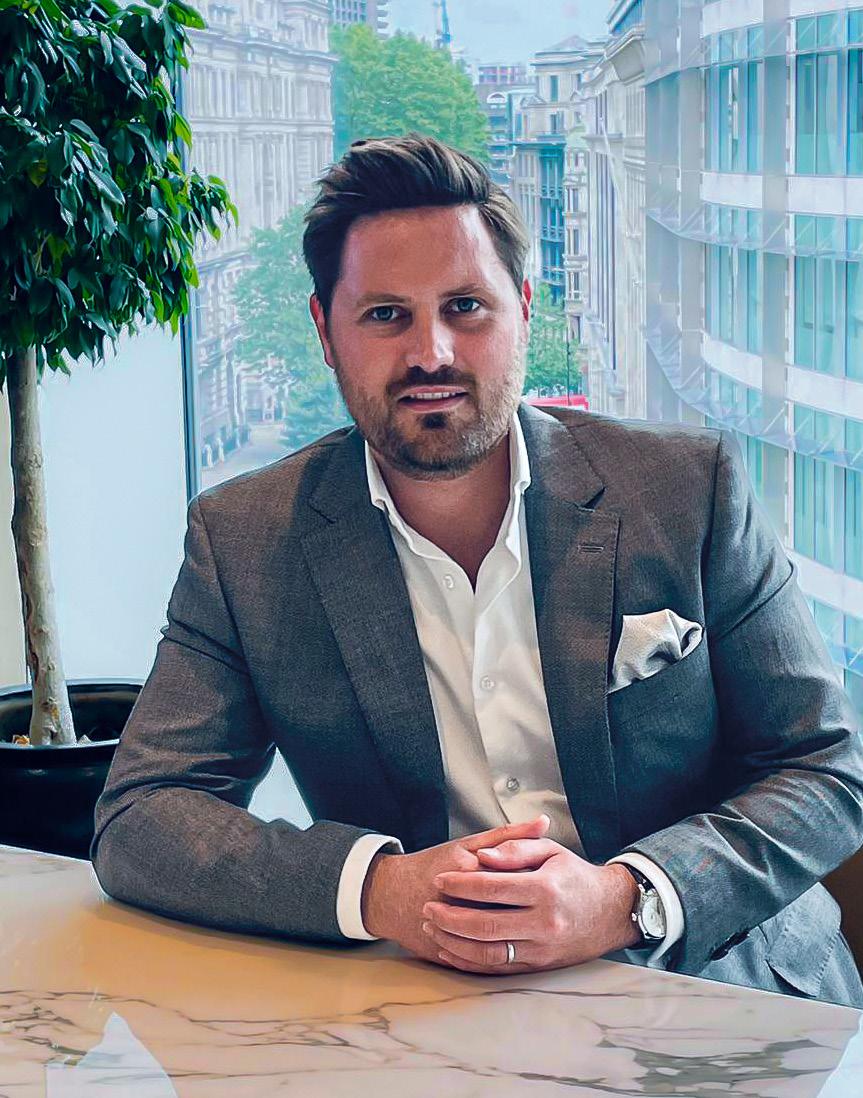

Oliver Chapman, OCI’s founder and CEO, explains: “What tends to happen is that one small piece of the supply chain gets disrupted, and the whole thing falls down. So, what OCI do is try to think of creative ways of managing that supply chain, so our clients can get their goods when they need them or where they need them.
“Supply chain disruption has softened a little bit, but now we’re seeing global recessions and other economic challenges, so I think the supply chain is now disrupted, and it may take quite a while for it to return to normal. At the same time, the shipping lines and logistics suppliers have capitalised on the disruption, so now logistics is much more expensive than it used to be. This can mean that it’s no longer viable for a company to buy from the partner they’ve worked with for 20 years, and businesses are now looking for another supplier.”
With more businesses looking to optimise their supply chains due to a difficult trading environment, OCI’s services have been in high demand. However, to enjoy their recent levels of success - which are virtually unrivalled across Europe - there must be factors that set them apart from the competition. And there is…


Chapman explains: “We’ve carved out a niche with what OCI is doing, and I don’t believe there’s another company tackling the problems in the same way globally. A couple of other businesses do similar things, but they tend to be financial institutions providing credit facilities for corporates, and that’s not the full solution. For example, a corporate would appreciate some financial support from an institution, but a bank can’t renegotiate a contract with a supplier in Asia, and that’s where OCI’s negotiation team will come in and manage that.
“We do deals where we save clients’ money on what they were paying before with OCI’s profits included. Take a hospital group in the USA – and hospital groups are renowned for being cumbersome and not very dynamic in some ways - and we’ve renegotiated the products we’re supplying and getting them a 10% discount. That’s huge savings when buying $500m worth of products a year.”
Although OCI is completely product-agnostic and doesn’t do much in commodities, they perform well and have considerable interest in pharmaceuticals, technology, electronics, digital media products and digital impressions. Incredibly, all their growth has been organic too.
because the cost of funds has increased past their profit margin. However, that doesn’t impact OCI’s business model.”
Chapman even admits that in some ways, OCI may have even benefitted from these economic challenges because they create pressure on businesses to reduce inefficiencies within their group, an area where OCI excels, as exemplified by stories of taking businesses from £50m to £350m in yearly turnover.
However, with corporation tax set to rise from 19% to 25% in April, OCI, like many other businesses, is set to lose a higher proportion of its revenue to HMRC. Their CEO is more than happy to pay off OCI’s fair share and thinks every corporate needs to contribute towards the huge debt built up during the Covid pandemic. OCI didn’t take much advantage of furlough and the Covid loan schemes that were available during this period but did experience hyper-growth.
“Our phones were off the hook,” says Chapman. “And what was interesting about it was that you had corporate hospital groups from the USA buying all their products from China, which is not the smartest way to do it.
According to the company’s founder, OCI has “hit a sweet spot where corporates want to work with us.” This is just as well considering the current economic climate is marred by an incoming recession, high inflation and rising interest rates. Interestingly, OCI has avoided major impacts from this difficult trading environment.
“We work with a lot of banks, and the cost of funds and price of borrowing money is going up, but it doesn’t impact us too much,” continues Chapman. “It’s an international problem, so it’s the same for us as it is for every corporate worldwide. Some businesses may then struggle to buy their goods
“OCI is a big advocate of country risk hedging so that we would structure your supply chain, so you’re not only buying from China, which is currently in lockdown, but you’re also buying from Vietnam and maybe Malaysia. If you’re based in the USA, you might even buy products from Mexico. Some say they’re not doing this because it’s more expensive but buying goods from Asia means longer shipping times and complications with supply chains, meaning by the time you’ve invested money in China and maybe got your goods four months later, you could get them from Mexico in a week. So, consider the financial cost if cash is tied up for four months.”
There’s a lot of education we have to do as an organisation, and we’re quite proud of that when I think of hedging country risk.”
“WE’VE CARVED OUT A NICHE WITH WHAT OCI IS DOING, AND I DON’T BELIEVE THERE’S ANOTHER COMPANY TACKLING THE PROBLEMS IN THE SAME WAY GLOBALLY.”
Chapman says some corporates are bound by regulation and resist doing things in the OCI way, but the company’s flexibility has meant they tend to be able to work around these challenges too.
Contrary to their outstanding growth, Chapman says OCI is trying not to grow too quickly and is putting solid foundations in place so they can continue to excel in the years ahead. Such a mindset might be considered more traditional compared to some of the fast-growing companies that we see nowadays, but OCI’s founder, who started importing and exporting pallets from China whilst at school, says business is “more like a hobby” and freely admits that they want to do business in the old form and not sell products for a loss to show
sales and growth. And considering OCI’s almost unprecedented growth, you’d be very brave to suggest an alternative mentality is required for OCI to continue growing. But despite aiming for continued growth, there is no plan to exit the business in the future.
Chapman elaborates: “Let’s keep an organic, straight-up business model that makes good profits, and then when we open it up to investors in the future, it will probably be
on a private front rather than going down an IPO route. However, if we do that, I think the rationale would be to work with the investor like a co-partnership, where OCI’s solutions would then benefit their portfolio of companies.”
“We’ll keep going with our organic growth. We don’t need to accelerate super hard and then crash fast. I want to build a business which is here in 30, 40 years, has rock solid foundations and will continue to perform.”
Over half of European business leaders expect Banking-as-aService (BaaS) to make traditional banking obsolete, according to new research from Vodeno/Aion.

The BaaS provider commissioned an independent study among more than 1,000 senior decision-makers within businesses based in the UK, Belgium and Netherlands. Its report, ‘Banking-as-a-Service 2.0 – Why Embedded Finance will make its mark in 2023’, reveals that 51% believe BaaS will spell the end of traditional banking.

Vodeno/Aion’s survey found that having the necessary licence and compliance expertise is set to play a more prominent role in BaaS adoption. Almost three in five (58%) respondents believe BaaS providers that offer to use its licence alongside a tech solution are the ones that will shape the BaaS market in the years to come.
At present, 39% of respondents have already implemented BaaS services and products, with an additional 38% considering using BaaS in the new year. When surveyed about which BaaS products were planned for implementation, foreign exchange (48%), buy now, pay later (48%), SME lending (47%), and loyalty schemes (46%) were among the most popular.
Wojciech Sobieraj, CEO of Vodeno, said: “Platform banking – where financial products are embedded in the customer journeys of brands people use every day – is the future.
We know that companies looking to implement BaaS also want care-free products and services, with the technology, necessary licence and regulatory checks offered in one combined solution.”
“I WANT TO BUILD A BUSINESS WHICH IS HERE IN 30, 40 YEARS, HAS ROCK SOLID FOUNDATIONS AND WILL CONTINUE TO PERFORM.”OCI crowned Overall Scale-Up Business of the Year at the Scale-Up Awards
Business Leader gives a rundown of recent appointments and promotions across various sectors.
FlyFeed, an international insect farming tech start-up, has announced the newest addition to its advisory board: Ahmed Hassan. The former General Manager of several subsidiaries at Colgate-Palmolive joined the company in a personal capacity to help optimise product development to the needs of feed producers.
The John Good Group has announced that Rachel Lowe has joined the Group as Chief Human Resources Officer. Rachel brings with her a wealth of experience and expertise in human resources, having previously held leadership roles at Victoria Plum, Ramsden International, and other blue-chip companies.
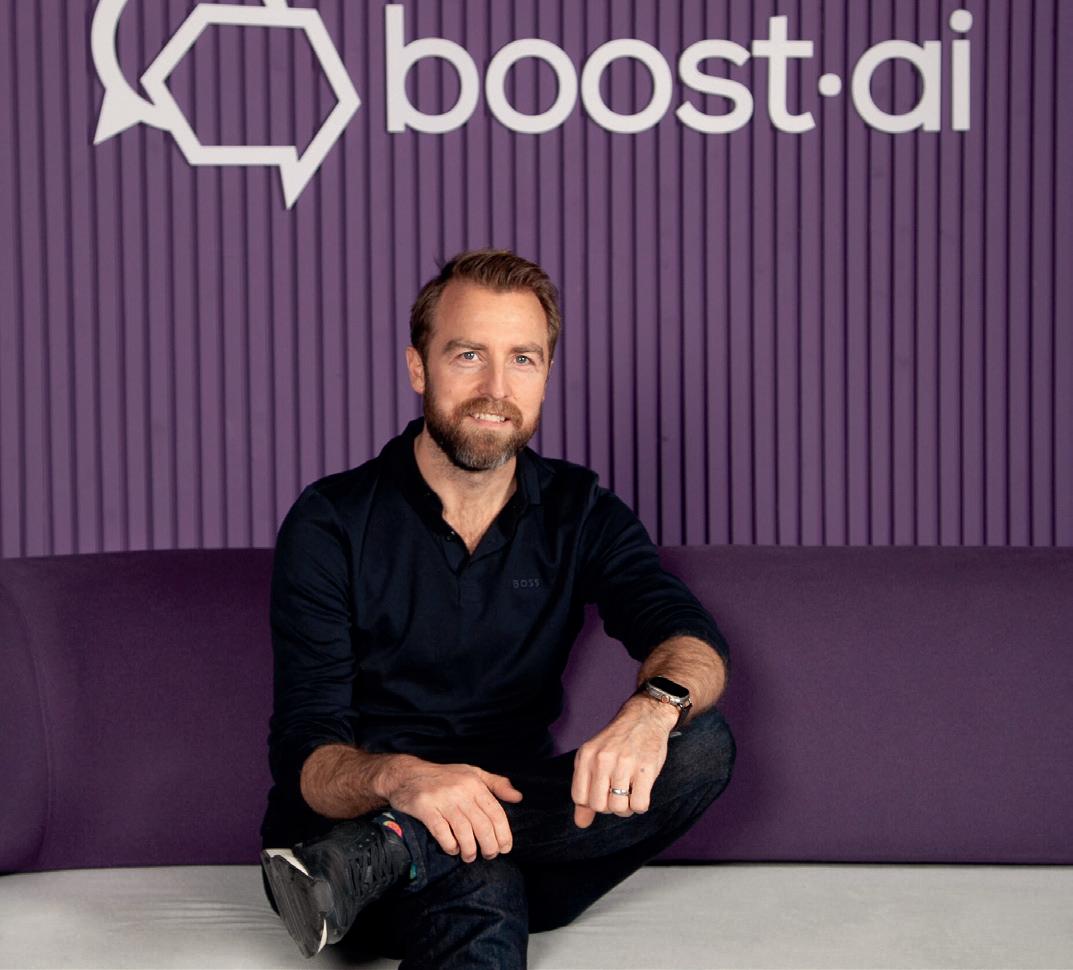
Boost.ai, a Nordic Capital-backed company in conversational AI for enterprises, has announced that Jerry Haywood is joining the company’s executive team as Chief Executive Officer. Haywood brings 20 years of enterprise technology experience and has held various sales and senior leadership positions at IBM, Cisco, and Salesforce.

Red Helix, a UK cyber security and network performance specialist, has appointed Marion Stewart as CEO to lead the next phase of growth. Established in 1984, Red Helix provides solutions and services to improve on premise and cloud application performance and cyber-security for major UK organisations.
monday.com, a work operating system where organisations of any size can create the tools and processes they need to manage every aspect of their work, has announced the promotion of Yoni Osherov to Chief Revenue Officer. Osherov will oversee all customerinteracting parts of the company, amounting to over half of the global team.
Pleo has announced the appointment of Meri Williams as its new Chief Technology Officer (CTO). Williams, the former CTO at mobile-first challenger bank Monzo, joins Pleo’s senior leadership team after previously working at AI-driven rare disease treatment discovery company Healx.
It’s often said that people don’t leave companies - they leave bosses. That’s because no one has a greater impact on the day-to-day life of employees, everything from professional development to personal performance and productivity. More importantly, business leaders take the lead in forming the overall vision and purpose; which ultimately helps to inform company culture. In short, there is no room to hide as a leader and there’s never a better time for self-reflection than the New Year. It provides company heads the perfect opportunity to stand up and hold themselves accountable for their own leadership style.
No role has experienced greater change in the post-pandemic environment than that of the business leader, who has had to navigate operations through back-toback uncertainty - as it turns out the ‘new normal’ was a myth. The biggest challenge business leaders now face, is leadership within the hybrid workplace. Once capable of finding one management style that suits and running with it, business leaders are now having to bridge two different styles. One that complements the traditional Monday through Friday model in-office, and another with remote and flexible working in mind.
In 2023, a more empowered, enlightened and hybrid workforce will demand even more from CEOs than ever before. While workers still require job structure, task identification, deliverable schedules, goals and metrics;

however, this hybrid way of life born during the pandemic, requires an extra element of care. This is a chance to rewrite the wrongs of previous leadership techniques, with the freedom of creating an agile leadership style that effectively works in collaboration with the hybrid workplace. For example, bosses will need to learn how to help maximise in-office days for collaboration, innovation, problem-solving and team-building events, or risk losing the focus of their team.
To foster accountability in a hybrid workplace, bosses must balance leadership demands, coaching requirements and performance management responsibilities. In essence, they need to wear three hats simultaneously serving as a leader, coach and manager.
• LEADER: Leaders engage and connect their team to the organisation’s goals. As a leader, 2023 is the year to doubledown on the vision and direction for the workgroup, aligning the efforts of individuals and teams to reach broader objectives together and as a team. As the main driver of culture it’s important to provide a consistent connection to properly communicate and reinforce overall culture.
• COACH: Coaches empower individuals to improve and teams to excel. In this position motivation and inspiration is key to helping employees realise their
goals and become the best they can be. Work with people to develop their skills, enhance their capabilities and realise their potential. Along with helping people set goals, try holding employees accountable for the activities and results needed to achieve those goals.
• MANAGER: Managers are responsible for individual and team performance. Clearly define roles, activities and responsibilities; set clear standards and expectations; and evaluate, critique and grade performance. Performance management is no longer about counting numbers or tracking attendance, but about ensuring the quality of deliverables.
For many businesses, 2022 was a year of global disruption, sudden inflation, and adapting to new ways of working. As we enter 2023 leaders are going to have to ensure that their approach to leadership remains just as fluid as the external landscape. Being a leader isn’t a simple approach, it’s 3D chess! Channel a leader, coach and manager at the same time, to not only allow your employees to feel at ease, but to ensure they are thriving and reaching their potential and in turn fuel business growth.
As a business leader, you k now that the hardest climb isn’t K ilimanjaro, Denali or Everest. I t ’s the CEO ’s leadership journey, and it ’s fraught with all k inds of challenges and oppor tunities, setbacks and advances. The good news is you don’t have to go it alone. You can travel with an experienced guide who k nows the lay of the land and an elite team of peers who’ve got your back .
You can equip yourself with world- class resources to navigate changing environments and uncertain conditions. You can take an approach forged over 60 years and travelled by 100,000+ CEOs of small and medium sized businesses around the world.
With that kind of suppor t, how high could you ascend?
I f you’re ready for the climb of a lifetime, the path star ts here. Learn more at vistage.co.uk
CEO Climbers Wanted

Join a team of peak per formers and take your business and your leadership to a whole new level.
Star t with your FREE guide: Journey to the Summit

The CEO’s 7 Laws of Leadership Visit vistage.co.uk /what-is-the - climb/



Ollie Ollerton is a former UK Special Forces operative, best known for appearing on the hit Channel 4 TV show SAS: Who Dares Wins. He is also the Founder and Managing Director at BreakPoint, a training company that utilises special forces techniques to deliver courses and workshops for corporate teams and leaders. We spoke to Ollie about the events that led him to start his own business, why reaching your breaking point can be positive and the benefits of not taking the path of least resistance.
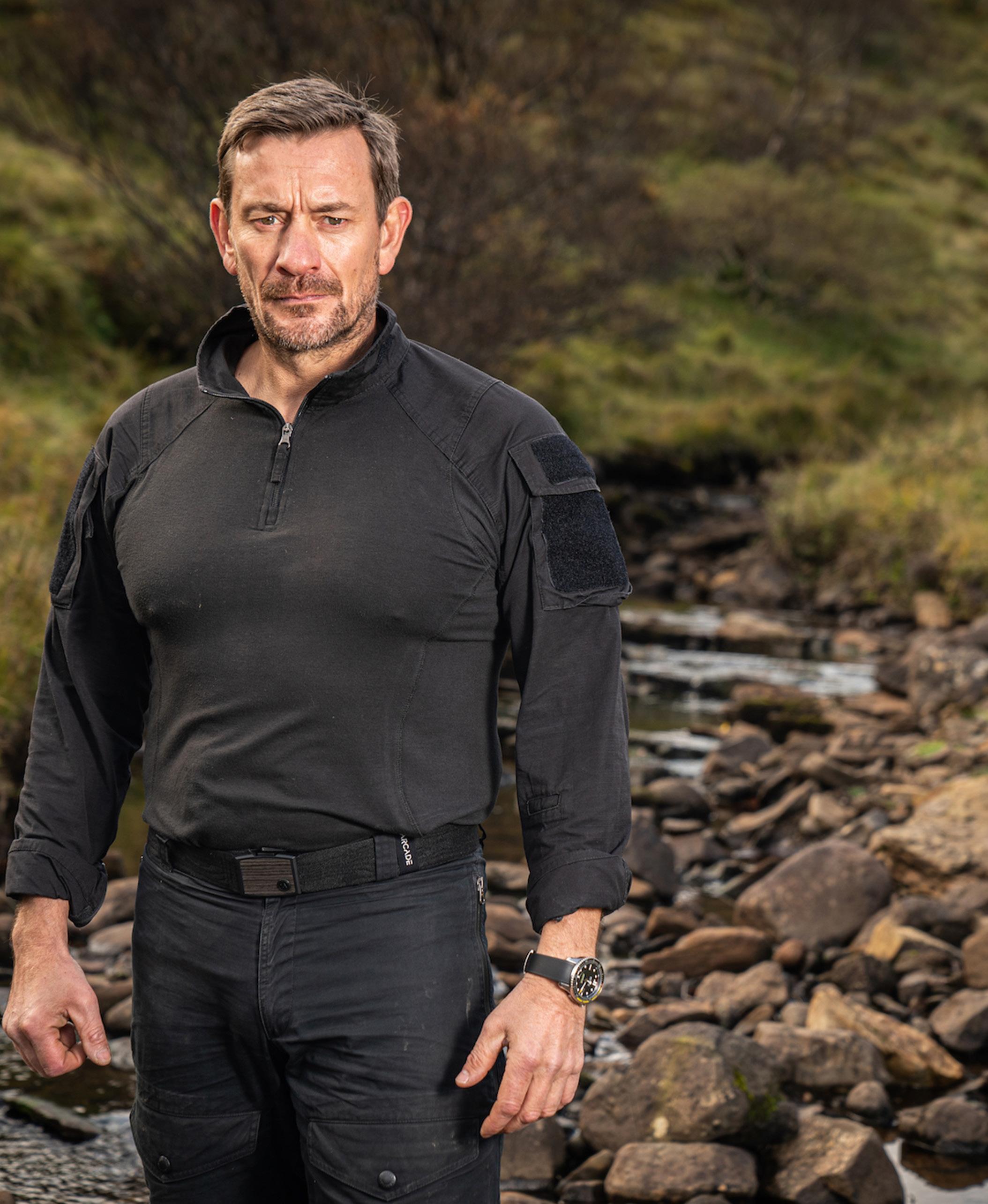
WHAT WAS YOUR LIFE LIKE GROWING UP AND WHAT MOTIVATED YOU TO JOIN THE SPECIAL FORCES IN THE FIRST PLACE?
That’s a complex question because I had a colourful upbringing. I had a traumatic experience at the age of ten and I can’t remember anything before that. I was attacked at a circus by a chimp and was nearly killed. It’s had a massive impact on who I am today because I didn’t deal with that trauma at the time.
This experience gave me a low sense of consequence and made me quite unemotional. I didn’t empathise with others’ emotions. I was always looking for danger and to push the envelope, which got me into a lot of trouble with the police and caused me a lot of heartache with my family.
WHEN DID YOU DECIDE TO JOIN THE SPECIAL FORCES?
For my mum, all her energy went into helping me focus on what I loved: fitness. I was greatly into athletics and the 1,500-metre run. Something just clicked with the Royal Marine Commandos – which is a bold thing for a 14-year-old to decide.
I was in Northern Ireland and then got called to Iraq and I was quite deflated because it wasn’t dangerous enough. It was a crossroads for me because I could either go to the special forces or be a civilian. The path of least resistance would have been to be a civilian.
My commanding officer at the time was shocked I was even considering this path, which was a shock to me because I didn’t understand his belief in me as a soldier. I had a lot of self-doubt at the time, and I think a lot of that came from idolising being in the military from such a young age.
This is the power of leadership – because what my commanding officer said, and his belief in me, changed my life and made me feel like I had a duty to try for the special forces. In those moments of self-doubt, I told myself to focus only on what I was doing that day, and don’t stagnate.
After six years, I went back to being a member of the public and said I would never go back to being in a war zone. Although, shortly enough, I ended up back in a war zone because I went back to doing what I knew best. I earned more money as a contractor in Iraq than I did in two years on the special forces, however, it was corrosive to who I was as a person.
We were getting attacked on a regular basis and that developed an unhealthy relationship with alcohol for me. Being hungover mixed with the anxiety of being in a warzone, I started taking Valium – you don’t need to be a psychiatrist to understand this isn’t the best combination. I decided to get out of there because if I didn’t go off on my own accord, I would have come back in a box.
I then went to Southeast Asia to save children from child prostitution. It was the best thing ever. I also felt like I’d found the piece I was missing from those military days. For the first time in my life, I was right on the coalface of being in service of others. This later became the heartbeat and DNA for BreakPoint – my mission statement is to develop a globally identified brand recognised for the positive growth and development of others.
DO YOU THINK THAT FIRST EXPERIENCE WITH THE CHIMP MADE YOU MORE LIKELY TO CHASE ADRENALINE-FILLED EXPERIENCES AND LESS SCARED OF DEATH?
That’s a difficult question because I don’t have an alternative journey to compare to. I would say there were positive and negative aspects to that traumatic experience. As a result of that experience, I was very dissatisfied and was always seeking as much as I could out of life – I didn’t know where to direct that energy and I didn’t understand who I was as a person. I didn’t understand what ‘purpose’ was.
I was suicidal at points – I never tried to commit suicide though – but then I took responsibility for my own life. For the first time, I stopped blaming the outside world for my issues – I stopped blaming the chimp, I stopped blaming the military and stopped blaming my upbringing. Yes, these difficult things happen in our lives but how we deal with them is really down to us.
DO YOU THINK IF YOU GO THROUGH ADVERSITY, YOU ARE MORE LIKELY TO HAVE CHARACTERISTICS LIKE DISCIPLINE, DETERMINATION AND MOTIVATION?
100% – there’s nothing like a near-death experience as a wake-up call. My first one was at the age of ten and that wasn’t my last one. I don’t think everyone needs to have had a near-death experience to find the value of life.
People look at me as someone who is resilient and determined, but people must understand that I don’t find it easy. I’m just like everyone else. I bleed and breathe like anyone else. Being the best version of yourself every day and being that constant model of improvement is a battle.
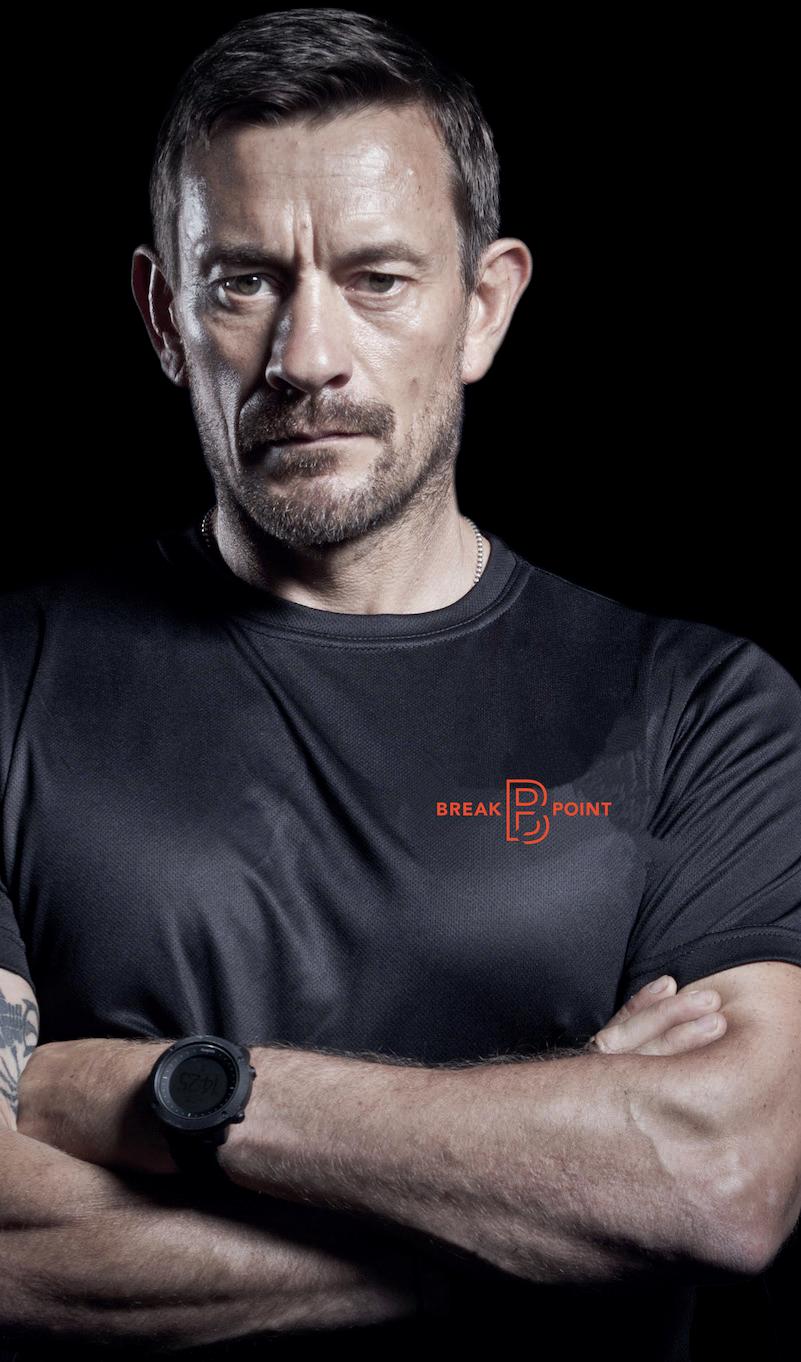
I still have that negative voice, but I know how to understand my emotions and I’m not a victim of them. We really must understand the source code of who we are as humans. The majority of people tiptoe through life just hoping they make it to death safely – you’ve really got to try and get the most out of everything.

WHAT DO YOU TELL YOURSELF IN THOSE MOMENTS WHEN YOU WANT TO GIVE UP?
BreakPoint is a disruptive change in habitual behaviour under a pre-determined goal. Bad behaviour is habitual, so it’s about understanding that we’re going to do something that is going to disrupt that habitual behaviour.
We have to make sure we know where we’re going, and we have to make sure the place we are going gives us so much passion and determination that we are prepared to deal with the discomfort of getting there.
We are wired to take short-term comfort that leads to long-term pain. People just throw in the towel when it’s far too much and then they regret giving up – you need to become aware of the thoughts and emotions going on inside of yourself and also have a strong ‘why’ – this will overpower any doubt. You don’t need to see the path or the footprints of the journey, you create them.
WHEN YOU DO FACE THOSE MOMENTS OF SELF-DOUBT, WHAT DO YOU DO?
Some people think: “Oh Ollie won’t have self-doubt.” Everyone has self-doubt, it’s what makes us human. But if you’re prepared for it, it’s not such a shock to the system. The more you focus on anything, the bigger it becomes. If you allow that to be the dominant message in your mind, it’s going to win.
It’s important to have a positive affirmation that dilutes any negativity. As soon as that negative thought comes in, you throw in that positive affirmation. The more you do that, you’re brainwashing yourself with positive thoughts in the same way the negative thoughts try to brainwash you.
Everyone is wired negatively. That goes back to our primal days –we are always looking for the things that may cause us danger.
The idea that life is hassle-free and problem-free is a utopia. The fact of the matter is, we were born out of struggle, we thrive through struggle, and I thank God for problems because it makes me grow. If there is nothing that is challenging you, you are going to have a very flat and boring life. Not only that, but you will go through some level of depression at some stage.
THE BUSINESS LEADER PODCAST NOW AVAILBLE ON

Tackling the climate crises can often seem like an otherworldly task when it is placed amidst the context of global demands, bickering politicians and overwhelming international conferences. There is lethargy too around the subject, as business leaders battle rising costs and ‘today’ challenges and with Brazil, India, Russia, China, and the USA often not pulling their weight, you can forgive leaders that place sustainability plans at the bottom of their to-do lists.
But as Mahatma Gandhi said, ‘be the change you want to see in the world’, and many UK businesses are taking great strides when it comes to their net zero carbon agendas. Also, the reality is that not only is it the right thing to do, the employees, funders and customers of the future will start to walk
away from businesses that talk a good game but don’t deliver.
We teamed up with Coreus Group to host a debate about the subject and to dig deeper into how companies feel about sustainability. What is happening behind the marketing slogans and nice words, and what can other scaling businesses learn?

One of the companies taking part in the debate was accountancy firm, Albert Goodman. On how they are taking steps to become net zero, Sophie Parkhouse who is a Partner at the firm, comments: “We have made a commitment to be net zero by 2030 and we’re looking at scope one and scope two emissions, as these are the ones that our most within our control.
“We’re looking at installing electric charge points for vehicles, encouraging cycle rates and we’re also looking at installing solar panels for our roofs. We also have a policy where unless a meeting isn’t going to benefit the firm or the client, we’re having virtual meetings.”
Ed Khodabandehloo is the Managing Director at Summerfield Developments, and he says that the sector is heading in a direction to be net zero carbon by 2030.
“Rightly, the sector is committed to being zero carbon and funders, stakeholders and housing associations are pushing us in this direction too,” he comments. “They want to see you hit certain criteria with the product you deliver.
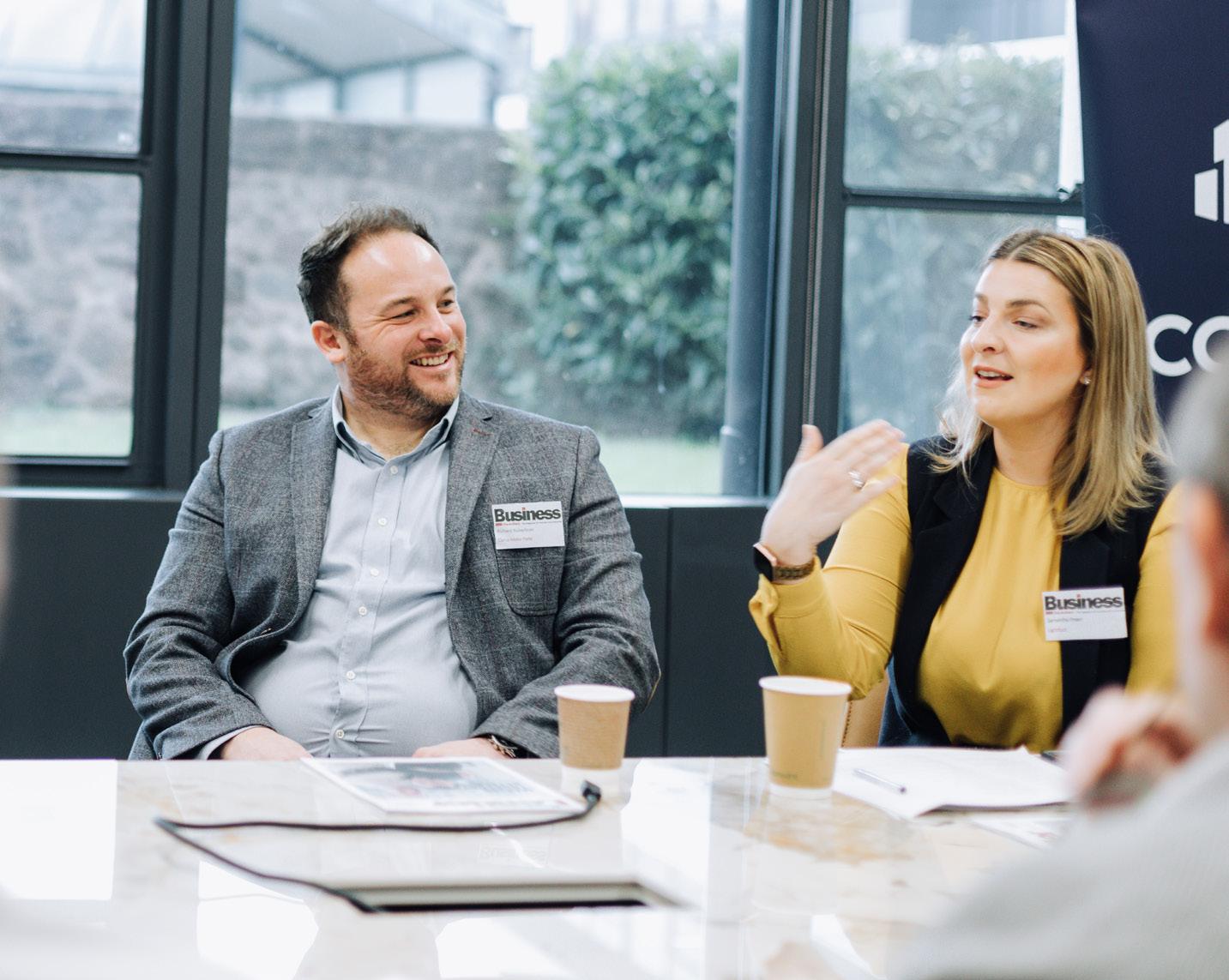

“It does add cost pressures though, in certain locations. This is because you will get a premium for delivering a net zero carbon house in a location that is considered desirable, whereas the pressure comes when you must deliver net zero homes in less desired locations. You put those houses on the sales market at a cost. It’s a scenario where those who need these homes most, can’t access them.”
Khodabandehloo also says that many lenders are giving better rates of interest if you can show real sustainable outcomes. Unlike the residential sector, delivering sustainable space in the commercial sector is much easier as employers are willing to pay a premium says Will Tomlinson, who is Development Director at Cubex Land.
He says: “It is easier to bring in sustainable technology and deliver sustainable projects in the commercial property sector. Businesses are happy to pay headline rents, as their employees want to be in sustainable buildings.”
For many leaders, becoming more sustainable can appear to add additional cost, but Jonathan Davis, Managing Director at Powerhaus UK believes that doing the right thing can save money. He explains: “It’s about culture and mindset first and it is something businesses will need to do if they want to stay on the right side of their customers. Yes, it is still price and service and all of that first, but people are going to want to buy from, and do business with, companies that have the right values too.”

“Businesses can afford to be more sustainable, and the argument is strong to say they can’t afford not to be. Do they need more help? There is a limit to the help that can be given but perhaps there should be more rewards for the companies that do the good stuff.”
Davis also says that businesses shouldn’t be worried about investing in technology and sustainable goods and it being defunct due to the pace of change: “The sector isn’t that fast-moving. When you look at solar, heat pumps and the like, there isn’t going to be transformational change. Many businesses have a mindset of just getting through the next five years due to rising costs but doing the right thing will reduce costs in the long run.”
One business that has proved just this is Ignition DG Ltd, an events and exhibition specialist. It is ahead of the game when it comes to being more sustainable.
Its CEO, Samantha Rowe explains more: “We started our sustainability journey sixteen years ago and we’re already carbon neutral for scope one and scope two and we’re now focusing on scope three. We are B Corp certified too. The biggest challenge we’re facing is around scope three, as it is very unclear what needs to be done. There isn’t one place you can go to find out.
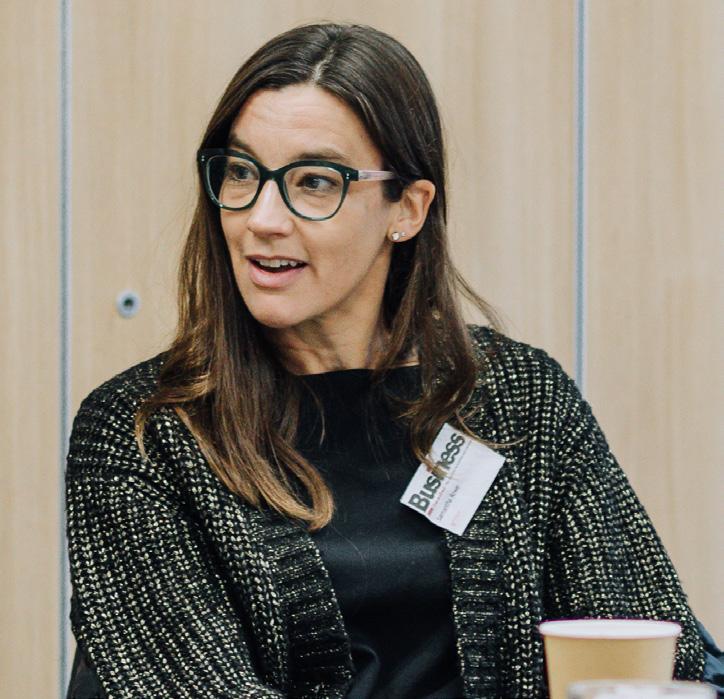

“For us though, as a business, it’s also about who we work with and connecting with suppliers that are sustainable.”
Rowe says the business is international too and has turned down work in countries that aren’t taking the issue seriously: “We have turned away lucrative business in places like the Middle East, which hasn’t always been great for our bottom line, but it is the right thing to do. In fact, we’ve won contracts at a premium because of our sustainability focus, so it is paying to keep true.”
With diesel cars being punished, the advent of brands like Tesla and clean air zones popping up in cities across the UK, the humble ‘car’ holds one of the keys to tackling climate change, but an experienced businessman in the sector believes there is still a long way to go.
“WE STARTED OUR SUSTAINABILITY JOURNEY SIXTEEN YEARS AGO AND WE’RE ALREADY CARBON NEUTRAL FOR SCOPE ONE AND SCOPE TWO AND WE’RE NOW FOCUSING ON SCOPE THREE.”
Samantha Rowe
them due to their cost point.”
An interesting business operating in the automotive space is Lightfoot. Samantha Preen, who is Head of Risk and Compliance, explains that the company have developed a technology product that delivers real-time information to drivers of fleet vehicles about how they are driving. She says the product influences driver behaviour and can save consumers and businesses on fuel and also reduce carbon emissions. She says: “We’ll get to a point where you’ll only need to charge your electric vehicle once a month, but before that our product is one of the solutions that can help drivers reduce their carbon emissions. You get feedback in real-time about how you are driving. If you are driving badly, you get prompts and after three prompts, you get a penalty. It’s all about gamification as you are ranked, and you can achieve elite status as a driver and win cars. We like to call it the Fitbit for cars or even the Strava for drivers.”
Businesses in the UK are clearly doing their bit and being innovative in a challenging environment, but there needs to be political will too, to really drive substantial change.

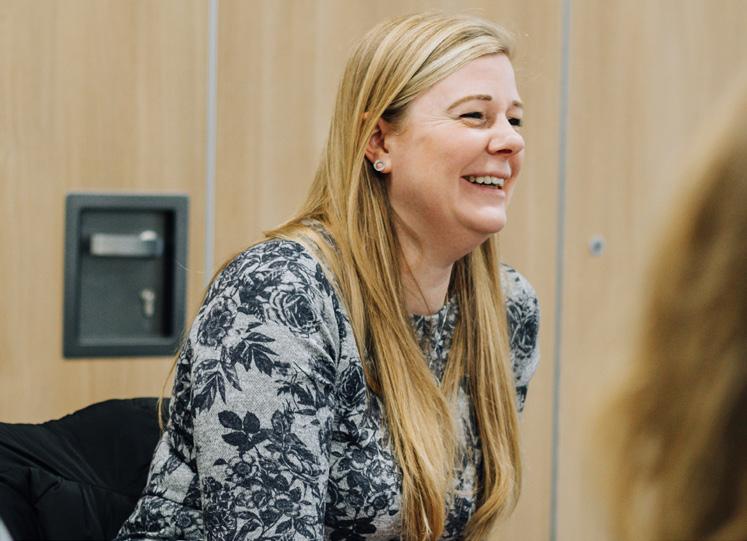
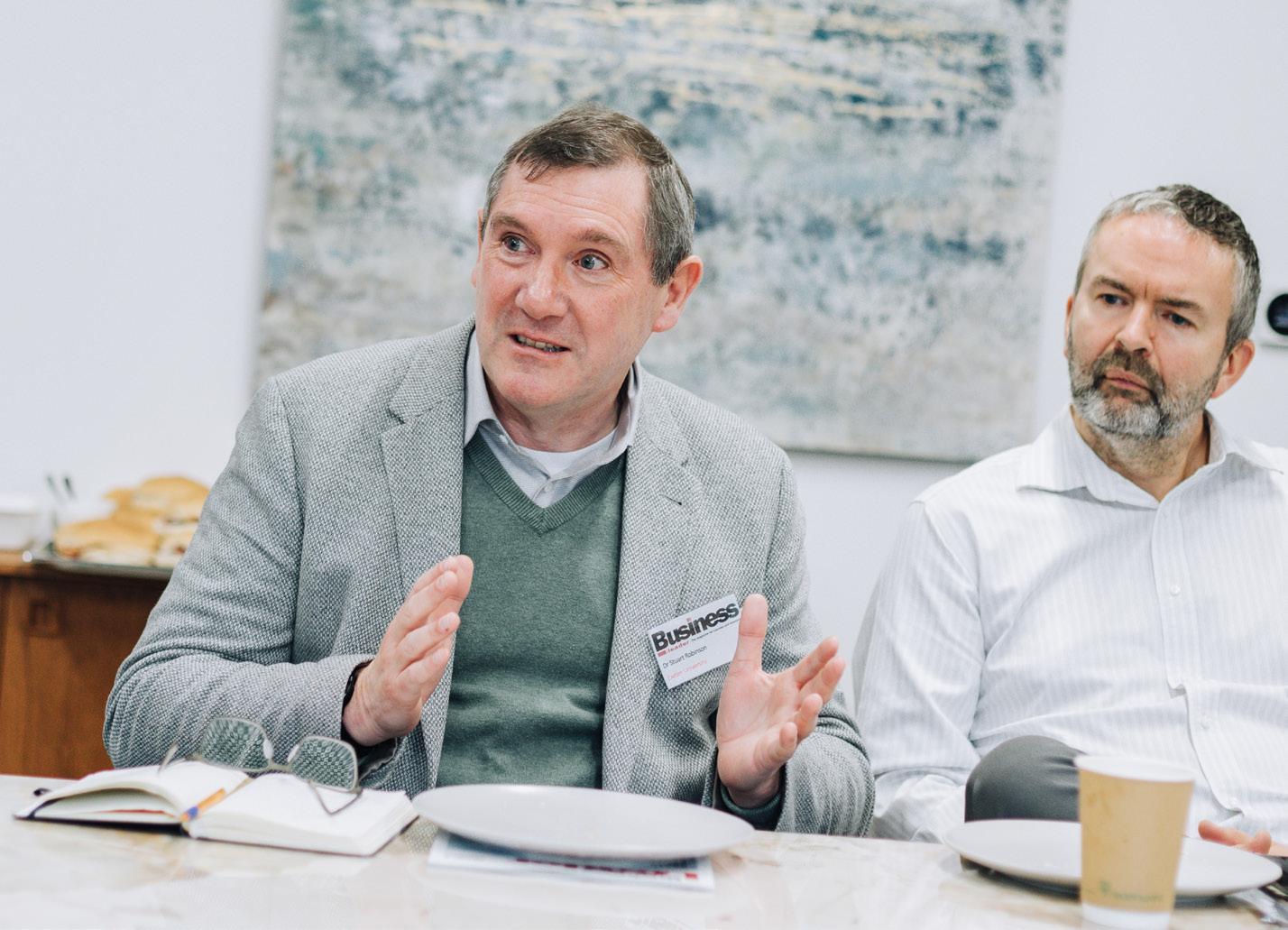
Dr Stuart Robinson works at Exeter University and has been working on sustainable initiatives and policy for many years. He believes that affordability and universality are two key issues that need to be addressed.
“How do we deal with a situation where a part of society can afford to be more sustainable but larger parts can’t?” says Robinson. “You can build a net zero house in one location but not in another, but it needs to be in that other place because that house is still emitting.
“It was discussed at COP 27 about transfers and who is going to pay for us to be more

sustainable. If we accept that something must be done then we should all pay for it, and this will mean policy changes from the government, otherwise, we’ll have a crisis that will get bigger.”

Robinson says his team have been looking at electrification in the UK and to hit 2050 net zero targets, the UK needs to double its generating capacity and the cost of this is huge and requires political solutions running alongside businesses all doing their bit.
Ed Khodabandehloo agrees with Robinson: “We can all do our bit as business owners –we can offer bigger car allowances for electric cars, but there have to be fundamental changes driven by government. This could be in the shape of tax breaks for consumers and business owners that actually tackle climate change.”
“YOU CAN BUILD A NET ZERO HOUSE IN ONE LOCATION BUT NOT IN ANOTHER, BUT IT NEEDS TO BE IN THAT OTHER PLACE BECAUSE THAT HOUSE IS STILL EMITTING.”
Dr Stuart Robinson
“WE CAN ALL DO OUR BIT AS BUSINESS OWNERS – WE CAN OFFER BIGGER CAR ALLOWANCES FOR ELECTRIC CARS, BUT THERE HAVE TO BE FUNDAMENTAL CHANGES DRIVEN BY GOVERNMENT. ”
Ed Khodabandehloo





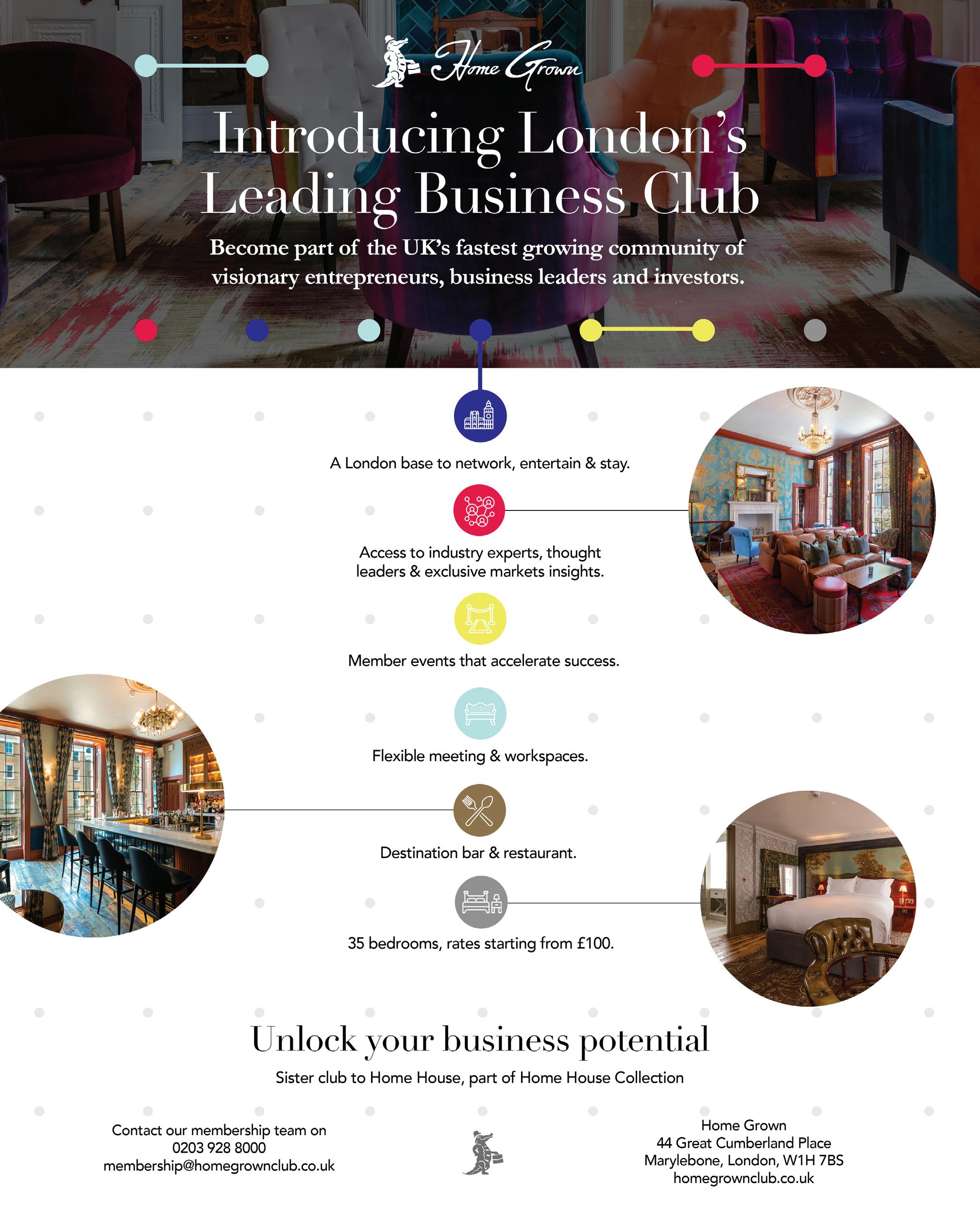






Get

This article is by Steven Oliver, Director at Peritus Group.
Dinah Washington once sang ‘What a Difference a Day Makes’, and whilst the property market doesn’t move at such a rapid pace, the last six months of 2022 saw a material shift in sentiment and values.
At the start of each year, we polish off our crystal ball and make our predictions for the year ahead, however before we begin predictions, I think it’s important to look at the headwinds we are currently encountering and the choppy seas we need to navigate.
If we cast our minds back, following the Global Financial Crisis (2008-9) one of the policy decisions made by Central Banks the world over was to reduce their relevant Base Rates to record lows. In the UK we saw Base falling from 5.75% in July 2007 to 0.5% by March 2009. This low cost of borrowing was designed to stimulate a faltering economy and we saw unprecedented moves to shore up (and partially nationalise) swathes of the banking sector.
Rates remained below 1% until 2016, but then we experienced the double impact of Brexit and Covid-19, which saw rates reduced further to 0.1% in March 2020.
This low-interest rate environment drove a huge growth in property values. A record-low cost of borrowing meant you could borrow more and pay less! Almost all sectors of the real estate market benefitted from the low cost of borrowing, however, the Industrial and Distribution sectors were the star performers with cheap debt coinciding
with record demand levels for space and corresponding rental and value growth.
Prime Yields (property value divided by rent) for industrial and logistics properties fell to around 3% (essentially the lower the yield, the higher the value of the property). Prime office yields came in at around 3.75%, and
Source: JS chart by amCharts
operational assets such as hotels, student accommodation, and care homes also traded below 4% yields. The fall in yield (leading to increased prices) was driven by expectations of strong rental growth and by the low returns available in the bond market. When government gilts were trading at less than 1% property yielding, even 3% was attractive. The availability of cheap debt at levels below property yields helped investors to leverage those returns - it was essentially the rocket fuel for property prices, however, it could not last forever.
One of the side effects of the low-interest rate environment was inflation. However, we now need to add in this political uncertainty (three Prime Ministers in as many months) and a disastrous war in Europe as Russia invaded Ukraine. This caused huge spikes in the cost of natural resources (oil, gas) and led to a real cost-of-living crisis in the UK, which was not aided by Kwasi Kwarteng’s mini-budget, which led to a major slide in the pound against most of its trading partners, among other material issues. Inflation is, at the time of writing, at 10.7% (CPI).
The Bank of England responded by increasing interest rates with the Base Rate now at 3.5% as of December 2022 and the expectation of further rises and a market prediction based on SONIA (Sterling Overnight Index Average), which is the rate Banks lend to one another at - and which
provides the reference rate for many real estate loans - reaching 4.73% in September 2023. This material rise in interest rates means that any borrowers who are not fixed will see their interest payments increase. On a £1m debt facility, the difference in interest costs between March 2020 and December 2022 is £340,000 pa (excluding any changes in the Banks margin).
And so, to our predictions. With a backdrop of high inflation (10.7% CPI) and much higher interest costs (3.5% Base Rate), we expect to see:
• The volume of property transactions in the market slow down materially.
• Reduced Leverage - Property Investors typically like to take on debt to buy properties to increase their returns, and the higher cost of borrowing means Banks and Lenders will be far more cautious about how much they wish to advance.
• Reducing Loan to Values (loan amount/ property value) from highs of say 60-65%, to around 50%.
• Refinancing issues – borrowers who took advantage of cheap finance rates will struggle to refinance their loans at the current interest rates and this may lead to a number of ‘distressed’ sales coming to market.
• Increase in loan defaults and repossessions will occur where borrowers cannot service their loan interest due to the cost of debt exceeding their rent. That said, we don’t expect this to lead to the failures in the market we saw in 2008.
• We believe that property yields will increase, which means prices will fall across most sectors with some sectors being hit harder (such as industrial and distribution).
• A strong focus on green credentials and ESG will mean it will be harder to finance property with a poor EPC rating.
• We believe the market outlook will be weaker over the next 12 months, however, this will also lead to opportunities for those ready to move quickly.
• Our view is that professional advice on debt and real estate strategies will be hugely important as navigating around the hundreds of lenders in the market and understanding their appetite and underwriting is essential.


Whilst we need to move on from, and stop talking about the pandemic, it did release a cacophony of challenges that business leaders are still grappling with today. One of which was an increase in cyber security threats as more people worked from home.
Leaders will remember the rush to buy laptops and equipment from PC World as employees were mandated to work from home. The point being, it meant the threat landscape altered as IT teams had less control over what employees were clicking on and responding to.
Chris Lennon is a cyber security commentator and the Director - Sales and Development, at Specialist Risk Group
Looking back, he says: “Many firms just didn’t have the IT capabilities but have broadly now responded to agile working. As you would expect, threat actors tried to exploit this flux. However, there weren’t new types of attacks but there was an increase in the frequency of phishing and smishing attacks, which are text messages saying your delivery hasn’t arrived and you need to click a link, for example.
“The vogue now for these types of threats is around energy pricing and in a moment of weakness, you can see how somebody would click on the link.”
Lennon says that no sector or business is immune from an attack and critical infrastructure is a key target for cyber criminals, although every business from every walk of life could be attacked.
“It’s not only a technology issue and you can’t just throw hardware at the problem because it is a people issue. You can spend all the money in the world on the best technology but if the people aren’t trained or if the tech is inflexible, this is where you will get issues,” he explains.
Knowing that the problem exists, many businesses just don’t seem to be gripping it sufficiently.
Paul Bentham, who is Chief Product Officer at Immersive Labs, says that the issue of cyber resilience is still not where it should be – at board and leadership level.
He says: “I agree that the solution to the problem is people, but it is still not sufficient at board level for too many businesses, and it needs to be. The connectivity of the world and business also means that many companies carry supply chain risks. Threat actors can get to what they want not by attacking the government or the big businesses but by compromising a smaller supplier that has the crown jewels of their personnel database.
“The message for small and scaling businesses is this. If you do business with big contractors, you must take cyber security seriously.”
Ryan Pullen, who is Head of Cyber Security at Stripe OLT, says another risk for businesses is employees. He explains: “People are now selling access to the company they work for to threat actors. It might be a disgruntled employee, for example, and there is no real silver bullet way of detecting that. They might not be getting a pay rise internally and a threat actor will say to them that I will give you £100k if you leave your laptop open when you finish work.”
To help our readers get a deeper understanding of the current threat landscape around cyber security, Business Leader was also privileged to talk to Deryck Mitchelson, a self-proclaimed ‘veteran cyber warrior’ that previously worked as Chief Information Security Officer at the NHS
“YOU CAN SPEND ALL THE MONEY IN THE WORLD ON THE BEST TECHNOLOGY BUT IF THE PEOPLE AREN’T TRAINED OR IF THE TECH IS INFLEXIBLE, THIS IS WHERE YOU WILL GET ISSUES.”
Chris Lennon


Giving a top line analysis of the cyber security threat for businesses, he says: “It’s a perfect storm now and the new ways of working sparked change too quickly. Businesses prioritised remote working, but they didn’t prioritise the security around this. These are two different types of conversations.
“Many firms don’t have good cyber hygiene and they are playing catch-up. People think that because they have Microsoft 365, they will be protected, but this isn’t the case. When you have a cyber-attack, only 40% of firms can do a full restore.”

Mitchelson continues: “I have never known an organisation that hasn’t been able to find investment funding to get a response up and running on the back of a breach, so why don’t they invest to prevent it and save money? I still don’t think it gets the level of funding pre-attack because the conversation isn’t there at board level and the narrative needs to change.

“If you walked away with boxes of paperwork from the office, people would say something. But you can walk away with a pen drive these days, so that does make tackling it more difficult.”
Paul Croker, who set up and runs 18it agrees with Mitchelson, that it does all start with the people.
He says: “It does all come back to the people, when you talk about cyber resilience because we’re having tech conversations with non-technology people. The subject needs to have more buy-in from leadership teams and we need to ask the question – what is business management really interested in?”
A time when you can get businesses to start listening is when they understand the scale of reputational damage a cyber breach might cause.
Chris Lennon elaborates on the difference a good and bad response can have: “You look at Talk Talk’s data breach and it resulted in £60m of shareholder value being lost. It wasn’t what happened but the PR response and how this was managed. They lost 650,000 odd records, whereas Carphone Warehouse lost 2.2 million records, but they didn’t have the interruption or negative press as they handled it better.
“Ultimately though, it is better to look at how you can stop it going wrong in the first place and mitigate reputational damage and loss of earnings going forward.”
On advice for businesses, Lennon also says: “Covering up rarely works. There are examples of businesses that have had breaches but fessed up and they have been open about what went wrong and their reputation was left intact. You need to have a process in place should it happen, and own up, talk to your customers, and manage the situation.”
Mitchelson adds: “The PR machine kicks in, doesn’t it? Companies try and play it down and say it was only a small attack, but it is not a small attack if you happened to be impacted. We need to move away from that world and to one where we share more because that is how you build trust.”
With employee retention such a big issue for businesses, Paul Croker says that businesses also need to think about staff welfare and what it might mean for an employee to be the one who causes a breach.
What may or may not surprise readers is how organised the cyber threat gangs are. Ryan Pullen explains: “The average cyber threat firm has 65 employees and small organisations simply don’t have the resources or financial ability to battle them.

“You can’t have a system where you say to an employee you have clicked on this, it went wrong and now you have to do some training, as that will seem like punishment. It needs to be more collaborative.”
Knowing what to do and having a plan in place if something does go wrong is important too but many businesses won’t even have a reaction strategy in place.
To find out what a good process looks like, Ben Holt, who is a lawyer at VWV, comments: “Firstly, you obviously need to stop the problem and work out what has happened. When assessing what has gone wrong, don’t mark your own homework. Get somebody external to do this. This will likely be a cyber security advisor.

“You then need to think about your public response but remember that putting something in a press release could kill your business, so don’t rush in. The response can be worse than the attack, so make sure it is measured and accurate.
“If the breach is criminal, then do get in touch with Action Fraud. It can take a long time for them to deal with the problem but call them and get on the list. You also need to report it to the ICO, but what you say is important and don’t give too much information at the early stages and be careful with language. Call it a data incident, rather than a breach.”
“WHEN ASSESSING WHAT HAS GONE WRONG, DON’T MARK YOUR OWN HOMEWORK. GET SOMEBODY EXTERNAL TO DO THIS. THIS WILL LIKELY BE A CYBER SECURITY ADVISOR.”
Ben Holt



























